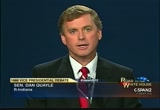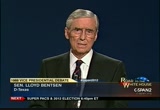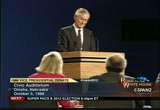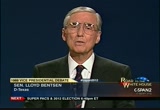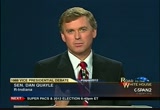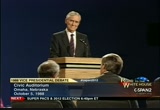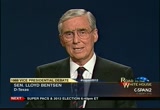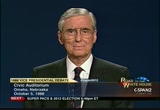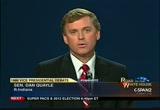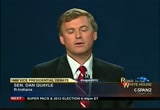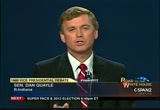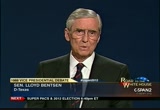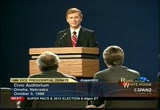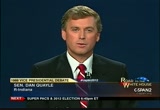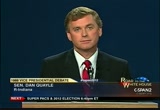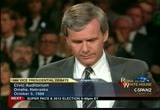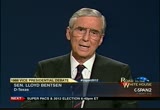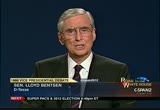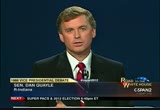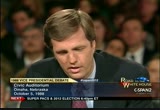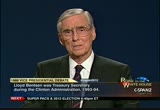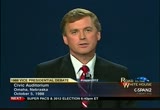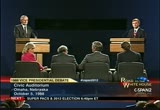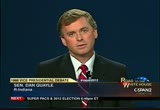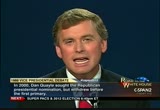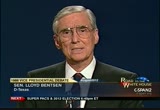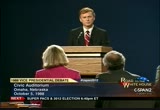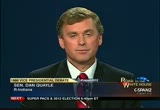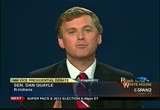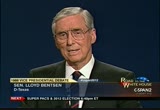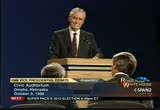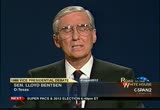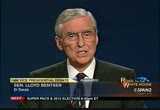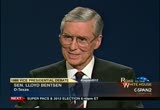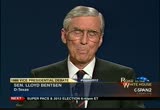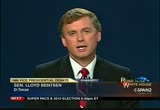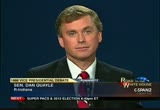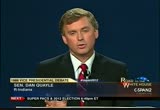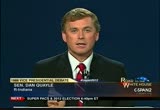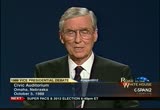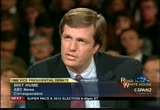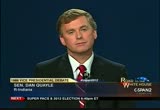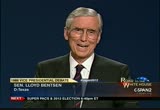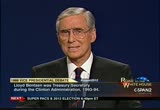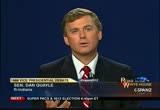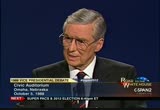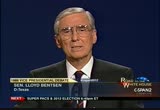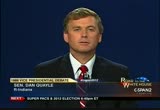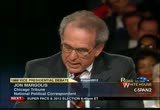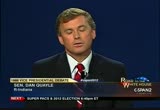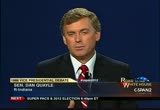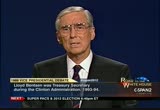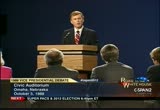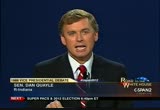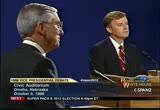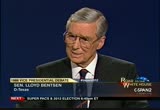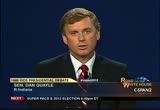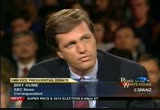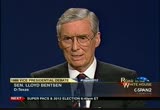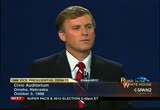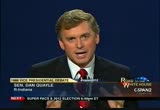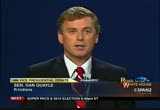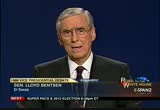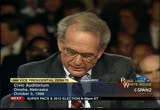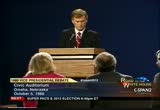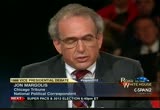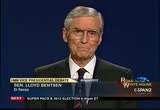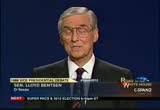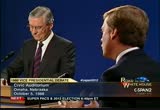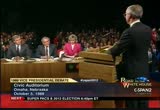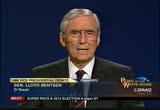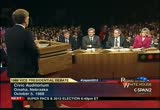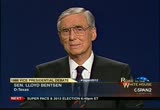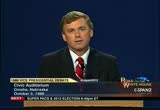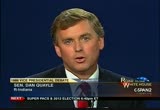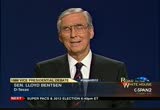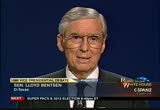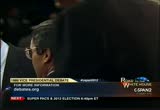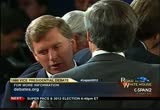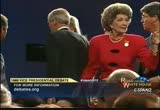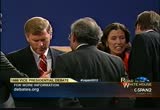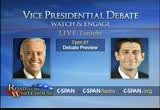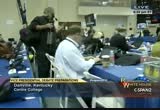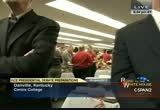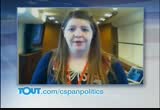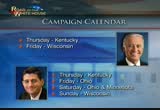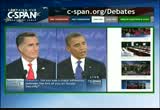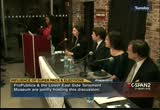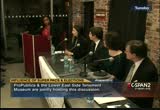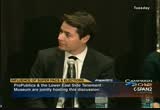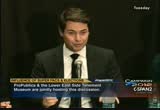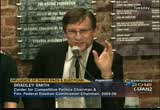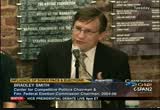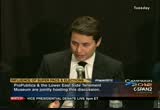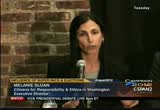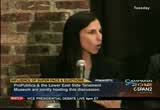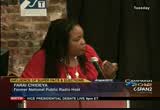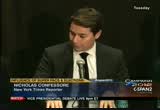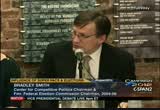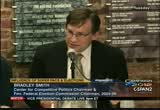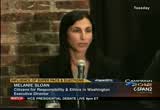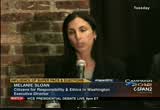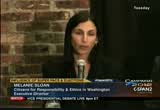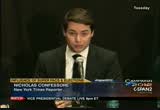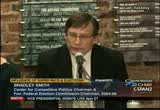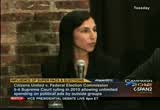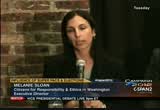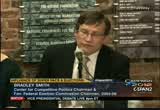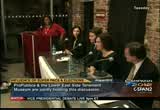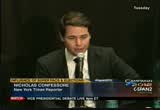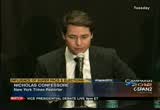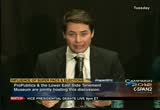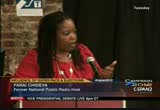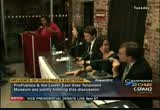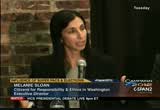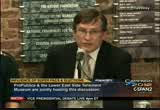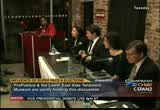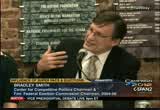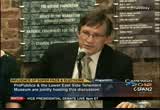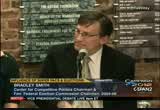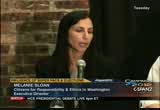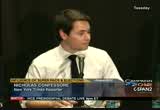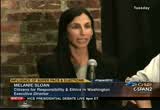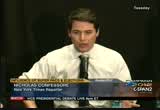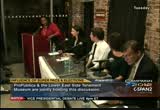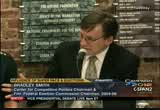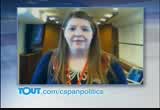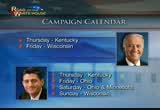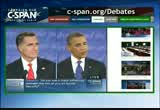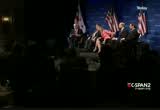tv U.S. Senate CSPAN October 11, 2012 5:00pm-8:00pm EDT
5:00 pm
5:01 pm
that tragedy should occur we have to step in without any margin for error, enough time for preparation to take over the responsibilities for the biggest job in the world, that of running this great country of ours, to take over the awesome responsibility for commanding the nuclear weaponry that this country has. the debate tonight is a debate about a presidential decision that has to be made by you. the stakes could not be higher. >> moderator: senator bentsen question for you and you have two minutes to respond. what bothers people was not so much for qualification, but your split on policy with governor dukakis. he has said that he does not want to clone himself, but you disagree with him on some major issues, a that the in nicaragua conference, did the death penalty, gun-control among others. if you had to step into the presidency, whose agenda would
5:02 pm
you pursue, yours or his? >> i am delighted to respond to that question. because we agree on so many things and in the best majority of the issues, we agree on the fact we have to cut this deficit. and governor dukakis has been able to cut the deficit ten budgets in a row in the state of massachusetts. while he lowered the tax burden on the people from one of the highest to one of the law were in the united states. that is a major sense of achievement and i admire that and i'm just delighted to be on the ticket with him. governor dukakis and i agree that we ought to have a trade policy for this country. but we've seen this administration more than double the national debt, that they've moved this country from the number one lender nation in the world to the number one destination in the world under their administration. they have not had a faith policy committee of let trade be a handmaiden for the policy objectives of the country.
5:03 pm
that this country has exported to many jobs and not enough profits. and as i work to pass a trade bill through the united states senate, through roadblocks every step of the way but we passed a trade bill that any country that has full access to the markets we are entitled to full access to their markets. now that means that we are going to stand tough for america and we are going to protect those jobs coming and we aren't a push american products and open up markets around the world showing leadership in that respect and turn this deficit and trade around. that's the sort of thing that michael dukakis and i will do to bring about a better america for all of our people >> moderator: senator quayle you have a minute to respond. quayle: he didn't tell you what governor dukakis will do.
5:04 pm
governor dukakis, one of the most liberal governors in the united states of america, the one thing he tried to point out that governor dukakis is that he has taxes. the fact the matter is, senator bentsen, he's raised taxes five times. he just raised taxes this last year and that is why people refer to him as "tax hike mike." that's why they refer to the state of massachusetts has taxachusettes because the governor raises taxes. i don't bling senator bentsen for talking about governor michael dukakis. he's talking more about his record. if i had to defend the liberal policies of governor michael dukakis, i wouldn't talk about it either by the >> moderator: jon margolis? >> he claimed that president bush and republicans would lead the trust fund and you are bound to protect it. as chairman of the senate finance committee you must know that there is something to the argument of your fellow democrat that some restraint on social security growth may be needed
5:05 pm
for the benefits as regular income. in fact you once voted for and spoke for a six month delay on the cost of living increases for social security. senator, aren't you and governor dukakis using this issue politically rather than dealing with it responsibly? bentsen: i hate to disappoint my good friend bob strauss but we have a contract with the american people on social security, and social security is an issue where senator quayle voted eight times to cut the benefits on social security. this administration came and tried to cut the benefits $122 a month for the retirees to cut the benefits for 62-year-old retirees tried to do an end run on social security when they first came in after promising not to cut it, to cut it by some
5:06 pm
20 million. and while we were working together to reform the social security system and to be certain that that money was going to be there for people when they retired at that point they tried authority billion dollar run to cut social security. the record is clear. we saw vice president bush drive back from the west coast to break the tie in the united states senate. it doesn't get a vote very often in the senate but he made a special trip to come back and vote against a cost-of-living increase. now, when you dhaka social security, the people that are going to protect it are the democrats that brought forth of that program, and i think it is very important that we not see these kind of end runs by this administration. and they talk about the fact that they are going to continue to cut this budget. i know too well with their track record is and we should be concerned about that kind of an effort once again after the election is over.
5:07 pm
>> moderator: senator quayle, your response? quayle: senator bentsen, you know i didn't vote to cut social security benefits eight times. what i have voted for and what senator bentsen has voted for is to delete the cost-of-living adjustments. senator bentsen two times in the united states senate voted to delay the cost of living adjustment. the new governor of massachusetts at the governors' conference supported a resolution to believe the cost of living adjustment and john, you're right they use this political advantage. they try to do it time and time again is to scare the old people of this country. that's the politics of the past. in 1983, republicans and democrats dropped their political swords and in a bipartisan effort save social security systems. republicans and democrats banded together because we know that this program is not a republican program. it's not a democrat program. it's a program for the older
5:08 pm
americans. and that program is naturally sound at the turn of the century. >> moderator: question for senator quayle? >> since coming to the senate you have environmental protection legislation about two-thirds of the time. pesticide control and toxic waste superfund house and safety protection from nuclear waste. senator, do you consider yourself an environmentalist, and if you do, how do you reconcile that with your voting record? quayle: i had a very strong record on the environment and the united states senate. [laughter] i have a record where i voted for the legislation. i have a record where i voted against my president of the override of the clean water act. i voted for the major pieces of environmental legislation that has come down and voted on in the united states senate. this administration i support
5:09 pm
this administration and its environmental effort is moved in the area of the first time to deal with the ozone problem. we now have an international plan to become a treaty that is commonly referred to as the montreal treaty. for the first time we are talking about the impact of the progress of the environment. we are committed to the impairment to take the children hiking and fishing, walking in the woods we have the commitment to reserving in the environment, to bring up the environment we can't help but think about the environmental policy of the governor of massachusetts. he talked about being an environmentalist. let me tell you about his environmental policy. the boston harbor, the boston harbor which is the dirtiest water we in america. tons of sewage go in their each and every day. what is the governor of
5:10 pm
massachusetts done about that? virtually nothing. and then he has the audacity to go back to new jersey and tell the people of new jersey that he is against ocean dumping. this is the same governor that applied for licenses to dump massachusetts sewage, waste off the coast of new jersey who has the environmental record and the environmental interest? george bush and i do. >> moderator: senator bentsen? bentsen: this conversion is interesting to me. [laughter] [applause] when he talks about a boston harbor and says he hasn't done anything, the facts are he has a 6 billion-dollar program under way on the waste treatment and it was this administration, their administration that cut out the money early on to be able to clean up water and made it impossible to move ahead on that time on the boston harbor the party of queen mary and the superfund in passing the
5:11 pm
superfund legislation and every environmental organization has now endorsed the bentsen ticket and i am one that has just received the environment, environmental award in texas for the work i've done to clean up the water off the coast of texas. i think we know who is going to clean up this environment. the record is there and the history is there and michael dukakis and bentsen will be committed to that. >> moderator: tom brokaw question for senator quayle. >> there's been a lot of talk of a campaign about family, the principal theme as i recall in your acceptance speech in new orleans, and i'd like to ask the 65 million american children who live with their families in poverty. the last time you visited with one of those families personally and how you explain to that family your votes against the breakfast program and lunch program and expansion of the
5:12 pm
child immunization program. [applause] i have met with those people and i met with them in fort wayne indiana at food banks the ask me questions on those votes because they were glad that i took time out of my schedule to go down and talk about how we are to get a food bank going it sure in fort wayne indiana. i have a very good record and a commitment for those that don't have the family want to have a family. this administration and a george bush administration would be committed to eradicating poverty. poverty hasn't gone up in this administration. it hasn't gone down much either and that means we have a challenge ahead of us. let me tell you something.
5:13 pm
what we have done before. what we have done for the poor is weak in fact of the homeless bill in the act which is a major piece of legislation that deals with homeless. the congress has cut the funding that the administration recommended. the poor and the poverty and the biggest thing that we have done for poverty in america is the tax simplification act of 1986. 6 million working families got off the payroll. 6 million people are off of the tax payroll because of that tax reform, and they are keeping the tax money there. to help the poor will have a commitment to the program and they're spending more in poverty programs today than we were in 1981. that is a fact. the poverty program that we are going to concentrate on is creating jobs and opportunities so that everyone will have the
5:14 pm
opportunity that they want. >> moderator: senator bentsen, your response? bentsen: i find that very interesting, because he has been of no help at all when it comes to passing the most major wall family for bill in the history of the country. we are working very hard to see that people can get off of welfare, break that cycle, take a step up doing the kind things we did there to let them have medicaid for the year that is a positive thing that it's done. but also frustrates me with a kind of reports that i just heard here is the kind of vote that he has cast against the child nutrition programs. the fact that he's voted against money that we needed for the further immunizations, the denial of polio shots to kids where the parents couldn't afford to get that kind of shot. now, i don't really believe that is identifying with concerns of people in poverty.
5:15 pm
>> moderator: tall a question for senator bentsen. >> senator bentsen i would like to go back to a question to be asked about the difference with michael dukakis. the contra aid is one of the issues of foreign policy in the country in the last eight years. you and michael dukakis seemed to be opposed to that. i've been told a closed session in the u.s. senate he made one of the most eloquent and statesmanlike speech is on behalf that anyone made in eight years of the term. but in fact you have alluded to the threat that the regime could pose to your own state of texas. governor dukakis on the other hand has described the policy has immoral and illegal. is he wrong? [applause] governor dukakis and i have agreed on the program, no question about that. but my big difference with this administration is they look at the program and it's the only way to resolve that program. they concentrate on that. and i really think we have to get a chance and that's why i've
5:16 pm
been a strong supporter of the plan. a plan that won the nobel prize for the president of costa rica. you have to work with of the leaders of those other central american countries to try to bring about the democratization of nicaragua and the negotiation by presser, by diplomatic pressure that we ought to be trying first. but in concentrating so much this administration hasn't paid enough attention to the rest of central america. the concern that i have is that we are a country with 85 million people with a 2,000-mile border for us. half of those people under the age of 15 a country that has its standard of living at 50% in the last six years we ought to be concerned about that and we ought to be involved. i speak their language and i spent a good part of my life
5:17 pm
down there. governor dukakis speaks spanish, too. he spent a good deal of time in central and south america and we believe that we ought to be working together with a new alliance for progress bringing in other countries to help. bringing in europeans, hispanics that have a real affinity for that. bringing in the japanese that have a great capital surface now and looking for places to invest. those are the policy things i think we could do to bring about peace in that area to help raise the standard of living and give them the kind of stability where democracy can proceed and can prosper. those are the kind of things that we would be committed to in the administration to try to make this world a better place in which to live >> moderator: senator quayle, your response. quayle: the aid would be cut off in nicaragua and that is unfortunate. the reason it is unfortunate is because it is beyond me but it's
5:18 pm
okay for the soviet union to put in billions of dollars to prop up the communist but somehow it's wrong for the united states to give a few dollars to the space resistance. there is a thing called the monroe doctrine, something the governor of massachusetts said has been superseded. i doubt many americans would agree with that. i think they've agreed. senator bentsen talked about the entire central america. another issue that michael dukakis is wrong on and that is grenada. he criticized the rescue mission according to a report. criticize that, yet 85% of the american people supported our rescue mission and we turned to the communist country into the non-communist country. the governor of massachusetts is simply out of step with mainstream america. >> moderator: brit hume a question for senator bentsen. [applause] >> senator bentsen, senator quayle. i am sort of the cleanup man in this order and i've been asked
5:19 pm
to deal with the answers on base. i have a follow-up question for you, senator quayle that senators be with a lot to ask the question i'm sure you are prepared to talk about. governor dukakis tried to make ethics a major issue in the campaign, and he has you as a running mate, a man who leads the league in the last count and that is the money raised by the special-interest organizations. that is a kind of campaign financing with governor dukakis finds so distasteful he's refused to accept it. t find that embarrassing? bentsen: i don't find it interesting of all because it is the result of the last campaign reform bill. one that talks about employees having bigger participation. what i've done in the money is just what my opponent and my campaign has done in his campaign. he has raising money, too saw what you have to do is comply with the laws as they are. whether you are paying taxes or
5:20 pm
playing a football game or whether you like those or not you can play with them. now, i have been for campaign reform and pushed it very hard. i believe that we have to do some things in that regard. but i've noticed that the senate of indiana a post that campaign reform and voted repeatedly against it. the things we have to do i believe that will cut back on soft money for exhibit, which i look back on as frankly one of those things that we have had to do because the republicans have done it for so long. i think it is a loophole frankly. but campaign reform, changing the rules of the game is something we have tried repeatedly in this session of the congress but only to have the republicans' lead the charge against us and the feed us and i wish that senator quayle would change his mind on that particular piece of legislation and give the kind of campaign reform law that i think is needed in america. >> moderator: senator quayle, your response?
5:21 pm
quayle: senator bentsen is the number one tax raiser. he is to have a 10,000-dollar breakfast club. 10,000-dollar breakfast club that only cost a paid lobbyist special-interest in washington to come down and have breakfast the chairman of the senate finance committee, the one that oversees all the tax loopholes in the tax code, $10,000. i'm sure they were not paying to have corn flakes. [laughter] i will tell you the kind of campaign reform i'm supporting comer senator bentsen i think it is time we get rid of it. support of legislation where we have totally eliminated contributions like special-interest and political action committees and let's have the individual contribute and the political party contribute. that is the kind of campaign reform that republicans are for. they want to get rid of the special-interest money and rely on the individuals and also the political parties. >> moderator: your question for senator quayle. let me caution the audience keep
5:22 pm
your reactions as quickly as possible. >> i want to take us back to the question asked about some of the apprehensions people might feel about you being a heartbeat away from the presidency and let's assume if we can for the sake of that question as to become vice president and the president is incapacitated one reason or another and you have to take the reins of power, when that moment came, what would be the first step that he would take, and why quayle: first i would say a prayer for myself, for the country that i am about to lead. and then i would assemble his people and this question keeps coming back to the qualifications and what kind of vice president in this hypothetical situation i had to assume responsibility as i've said age alone although i can
5:23 pm
tell you in the campaign i've added ten years to my age. age alone is not the only qualification. you've got to look at experience and you've got to look at accomplishments. can you make a difference? have i made a difference in the united states senate where i served for eight years? yes, i have. have i made a difference in a congress that i've served for eight years? yes, i have. as i said before, looking at the issue of the qualifications i am delighted that it comes up because of the three most important challenges facing america, arms control and national security, jobs and education and budget deficit by half experience and accomplishments than does the governor in massachusetts. i have been in the congress and i have worked on these issues. believe me, when you look to the arms control and try to deal
5:24 pm
with the soviet union, you cannot come at it from a nine leaf position. you have to understand the soviet position and understand how they will respond. sitting on that committee for eight years to deal with the soviet union and how we can move forward that is just one of the troubling issues that is going to be facing this nation. >> quayle their something on the table he's charged me with so let's get to that one when you talk about the breakfast club, as you know, there was perfectly legal and biform did and i closed it down almost immediately because i thought the perception was bad. but it's the same law that let you invite the high-priced lobbyists down to williamsburg. bring them down there and entertain them playing golf and
5:25 pm
playing tennis and bring in the republican senators to have exchange for that contributions to their campaign. it's the same kind of law that lets you collect over a quarter of a million dollars of honorariums now speaking to the various interest groups. you can spend it on anything you want to. that's why we need campaign reform law is and why i support them and to report them time and time again to the [applause] >> moderator: question for senator quayle. >> the reagan administration has scaled back the opportunity of the health and safety administration prompting by vice president bush task force on regulatory relief it's been cut by 20% and the number of inspections and manufacturing plants has been reduced by 30%.
5:26 pm
this is a specialist in the real were many people work in the meatpacking industry which is a far higher rate of serious injuries than almost any other injury and which appears to have been rising and some of the largest companies that allegedly falsifying the reports if you acknowledge to the hundreds of injured people in nebraska, iowa and elsewhere in the midwest the deregulation might have gone too far and the government should reassert itself in protecting the workers' rights. quayle: the premise of the question is the administration has been lack in enforcement and i disagree with that i tell you why if you want to ask some business people that i talked to periodically, they complain about enforcement of this administration, and furthermore, let me tell you this for the record when we have found violations in this
5:27 pm
administration, there's not only been tough enforcement, but the most severe penalties, the largest penalties in the history of the department of labor has been led under the violations found. they deserve it and we are committed to carry the the broad question goes to the whole issue of the regulations has a regulation worked on not worked? in my opinion regulation has worked. we've had a deregulated economy and we have produced through the deregulation, the spirit of the entrepreneur ship the individual going out and starting a business. the businessman or woman going out to risk their investments to start a business and hire
5:28 pm
people. we have produced 17 million jobs in this country since 1982 deregulation as a form of political process he is a good philosophy it's one that we agree with. they want a centralized government. but we believe in the market. we believe in the people coming investor is a role of government, and the role of government is to make sure that those safety and welfare of the people are taken care of. and we will continue to do that. >> moderator: senator bentsen? bentsen: i think we can see peace the debate, and the legislation that has been passed to try to protect the working men and women of america and you've seen the administration that came in and really didn't have its heart in that kind of enforcement. a good example of that is the environmental protection law that we were talking about a moment ago. this administration came in and put in. that is the bonnie and clyde of
5:29 pm
the environmental protection. that's why it's important that you have people that truly believe trying to present the working men and women of america. most employers to a good job of that. some of them to their profits before people and thus far that when you have to have osha and tough and good and fair enforcement of it. and that's what a democratic administration would do to help make this work in place a safer and a better place to be employed. >> moderator: john another question for senator bentsen. >> since you've been in the senate the government spent increasing amounts of money in the effort to protect the family farmer. when most of the subsidies seem to do the rich and largest farmers that needed lease while they are often forced to sellout sometimes to their large former neighborhood has gotten more subsidies to begin with. despite the fact that i believe you are a rather large farmer yourself, do you believe it is
5:30 pm
time to uncouple the subsidy formula from the amount of land that a former house and target the federal money to small and medium-sized farm? bentsen: well, i've supported that and i voted for the 50,000 limitation to get away from the million-dollar contribution to farmers. before that are on the ticket - the only one the was born on a farm and stila involved in farming so i think i understand their concerns and their problems. i feel very strongly that we ought to be doing more for the american farmer and what we have seen under this administration the neglect of that former they seem to think the answer is move them to count what you've seen them do is cut the assistance for the rural area by over 50%. we are seeing the hospitals close of the country which lost
5:31 pm
much of our market abroad because they haven't had the policy. we see the market lost by some 40% and that is one of the reasons that we have seen the cost of the program which was only about $2.5 billion when they took office. now go to about $25 billion. now we can bring that kind of cost down and get more to the market prices if we will have a good trade policy. i was in january visiting with the new prime minister of japan. i said you are paying five times as much for beef as we pay for in our country. six times as much for rice. you have a 60 billion-dollar trade surplus with us and you could improve the standard of living to the people. sending 27% on food, we spent 15%. when you have that kind of a barrier against us that's not free and fair trade, and we
5:32 pm
don't believe that should continue. we would be pushing very hard to open up those markets and stand up to the american farmer and see that we recapture those foreign markets and i think that we can do it with a dukakis and bentsen of patrician. quayle: i will tell you one way that we are not bring to the captured foreign markets and that is if and when we have another jimmy carter in barbaro -- embargo said the american farmer back. every one of% of increased interest rates, a billion dollars out of the farmer's pocket and that income increased inflation that is supply management, the democratic laforme talks about. but the governor of massachusetts has a farm program
5:33 pm
and told them not to grow corn or soybeans, but to grow belgium. that is what he and his buddies think of the american farmer to tell the farmers not to grow corn, not to grow soybeans that is the kind of policy that you will get under the administration and one - that the american farmer will reject. estimate a question for senator bentsen. >> you businessmen before you entered. let me offer an inventory if i may. a lower interest rates, lower unemployment, lower inflation and arms control deal with the soviet union. now the come to the door of the business and say we would like you to change without offering a lot of specifics. why would you accept their deal.
5:34 pm
[applause] this is an administration that is more than doubled the national debt and they have done that in less than eight years they've taken this country from the number one linder nation in the world to the number one debt nation in the world. and the interest on that next year on this reagan bush and debt is quinby six covered $40 billion with every man, woman and child in america because of this kind of a credit card mentality. so, we go out and try to sell our securities every week and hope that they will buy them and they do buy them but every time they do we lose some of the economic independence for the future. now they've turned around and they bought 10% of the manufacturing base in this country. they bought 20% of the banks. the of 46% of the commercial real-estate and los angeles.
5:35 pm
they are buying america. now when we have other countries that can't manage their economies down in central and south america we send down the american ambassador. we send down the international monetary fund, and we tell them what they can buy and what they can sell and how to run their economy. the ultimate irony would be to have that happen to us because foreigners put buying our security. so, what we need in this country is for someone like michael dukakis who gave the balanced budget in a row and was able to do that come to me that kind of commitment and said those priorities. we need an administration will turn the policy around a and open up those markets, stand tough to the trading partners to keep the jobs at home and send the product abroad. >> moderator: senator quayle? >> senator bentsen talks about running up the debt. the governor of massachusetts
5:36 pm
has run up more debt than all of the governors in the history of massachusetts combined going back to the days of the pilgrims and don't believe that is the kind of policy that we want. the question went to the heart of the matter. you asked the question why would be changed? we have changed since 1980. we have interest rates down, inflation down, people are working again, america is held in respect once again around the world. though we are going to build on that change. and as we need those positive changes of the lower interest rates and the lower rate of inflation, the governor of massachusetts fought us every step of the way. we are proud of the record of accomplishment and the opportunities and the hope for millions of americans, who and opportunity of these americans because of the policies that we have had for the last eight years and we want to build on that and change for even better.
5:37 pm
>> moderator: a question for senator quayle. >> you and supported the military operation to see the american medical students and rescue and ireland from a marxist takeover. if the military force was necessary in that endeavor, will not use the military to go after the south american drug cartels and after the general and a surgical strike in the minds of most americans oppose a far greater danger to many more people. quayle yanna absolutely right. the drug problem is the number-one issue. i will address the military aspect if i may respond. the military aspect of the problem is being addressed. as a matter of fact, we are using the department of defense and a coordinated effort, but i don't believe that we are going to turn the department of defense and to a police organization.
5:38 pm
we are using our military assets and a prudent way to deal with the introduction, and we have made some success in this area. 70 tons of cocaine have been stopped. but you know when you look at the drug problem, and it is a tremendous problem and there are no so easy solutions to it. it is a complicated problem and it's heading up the effort to try to create a drug free america not only will we utilize national defence and the department of defense we've got to get to education and education ought to begin at home and not to be reinforced in our schools. there is another thing they're will be more important than the premise of this question on a hypothetical of using troops. we will use the military assets. we are not going to -- we will use military assets, but we need to focus on another part of this problem, and that problem as law enforcement. and here is where we have a major disagreement with the
5:39 pm
governor of massachusetts. he has opposed to the death penalty for the drug kingpins. we believe people convicted of that crime deserves a death penalty as does the legislation that is supported by the bipartisan including many democrats of his party. he also is opposed to mandatory drug sentencing for drug dealers in the state of massachusetts. you cannot have a war on drugs. you cannot be tough on drugs and weak on crime >> it's interesting to see that the senator from indiana, when we had a resolution on the floor of the united states for kacmarik sponsored by governor dole he was one of the senators that voted against it and it's also interesting to see about one of his campaign managers trying to help him with his image was also hired by noriega
5:40 pm
to help him with his image. [applause] what we have seen under this ad fenestration we've seen them using eight cabinet officers, 28 different agencies all fighting over turf and that is one thing that we create under the dukakis bentsen administration, we put one in charge of the war on drugs and have the resources to get the job done. michael dukakis has been able to do that type of thing in the state of massachusetts by cutting the drug use and high schools while what is going up around the rest of the country. by putting in a drug educational program, like the drug enforcement agency said was a model to the country we would be going back around the rest of the country. that is a positive attack against drugs. >> moderator: brit hume a question for senator quayle dubious the matter went to go back to a question i asked you to take over in emergency and when you would do first and why. you said you would say a prayer
5:41 pm
and you said something about a meeting. well what you do next? quayle: i don't believe it is proper for me to get into the specifics of the hypothetical situation. the situation is if i was called upon to serve as the president of this country or the responsibility of the country to be qualified to do that and i tried to list the qualifications of 12 years and the united states congress. i served in the congress for 12 years but i served in the congress and served eight years on the senate armed services committee. i traveled a number of times. i've been to geneva many times to meet with our negotiators as we are hammering out the treaty. i've met with the western
5:42 pm
political leaders. i know them. they know me. i know what it takes to lead this country forward. and if that situation arises yes i will be prepared and will be prepared to leave this country if that happens. [applause] >> moderator: senator bentsen? bentsen: someone that can step into the presidency level of that tragedy would occur, and if that is the case, again you have to look at the maturity and judgment, and you have to look at the experience. you have to see what the leadership role that person has played in his life before that crisis stock. if you do that type of thing that you write in the judgment that i think would be a wise one
5:43 pm
and i hope that would mean that you would say we are going to move for -- but for michael dukakis and lloyd bentsen. >> moderator: question for senator bentsen. >> i want to go back to the celebrated breakfast club when it was first revealed to have a plan to take people to thousand dollars to have a breakfast with you. you handled it with disarming not to say charming candor use it was a mistake and were widely praised for having handled the best. the question i have is it the "washington post" had not broken that story and other media picked up on it, how can you tell us tonight as to why we should not believe that he would still be having those to this day? [laughter] >> bentsen: as you know i immediately disbanded. it was perfectly legal and you have all kinds on the hill and you know that but i still
5:44 pm
believe that a better way to go is to have a campaign reform law that takes care of that kind of situation even the biggest legal the perception is bad to reform the entire situation. i've worked for that end and opposed repeatedly vote after vote. quayle: he disbanded the club but he still got the money. he is the number one receiver of the political action money. let's eliminate the committee to the special-interest money, legislation for the congress to do that and the number one pack razor we can go back and get the
5:45 pm
contributions from the working men and women and individuals america. we can also strengthen the two-party system does need strengthening and rely more on the political parties than we have in the past. that's the kind of campaign reform on the import and i hope the senator will join me. >> moderator: a question for senator bentsen. >> we finished one of the hottest summers america can remember and we will be the fifth out of the nine on record. no one knows what most scientists think something we're doing exacerbating this problem and that this occurred in a couple of generations threatening our descendants and perhaps even their existence. as vice president what would you urge the government to do to deal with this problem and specifically could you support a substantial reduction in the use of fossil fuels which might be necessary down the road?
5:46 pm
bentsen: i think what would be very helpful list to use a lot more natural gas, which burns a lot cleaner and what michael dukakis said is he will try to break down the regulatory roadblock that you have in the regulatory agency that denies that natural gas to the east where you can fight against acid rain which is another thread because it's still analyzing the lakes and killing the fish and it's interesting to me to see the resume at senator quayle he brags on the fact he's been able to fight the acid rain legislation. i don't think that that's the proper objective and planning of this environment. but the greenhouse effect is one that has to be a threat to all of us and we have to look for alternative sources of fuel and i supported very strongly. the department of energy is one that has cut back substantially on the study of those alternative sources. we can use other things that will help the farmer.
5:47 pm
they will be necessary to the environment of the country number one because if we don't protect that, we will destroy the future of the children and we must be committed to try to clean up the water and clean up the air and do everything we can not only from the research standpoint, but also in the applied legislation to see that that is carried out. >> moderator: senator quayle? quayle: vice president george bush has said he will take on the environmental problem. he said further that he will deal with the acid rain legislation and then reduce millions of tons. that legislation won't get through the congress this year but will get through the george bush administration.
5:48 pm
the george bush administration that is committed to the environment. the greenhouse effect is an important environmental issue and it's important for us to get the data in to see what alternatives we might have in a fossil fuel to make sure that we know what we are doing and there are explorations and things we can consider in this area highlighted in the the problem and the george bush and administration and even though we will. >> moderator: a question for senator quayle. >> senator, as vice president, your most important contribution would be the advice of the president. one of the most troubling facts that is going to face the new administration is the fact that the united states has become the world's largest debtor nation. in 1987, foreigners have the tune of about $138 billion. last week the top official of the japanese economic planning
5:49 pm
agency bride that japan now is in the position to influence the value of a dollar of the interest rates and even the stock prices and he warned that one day they would do just that if you were vice president of the united states and japan did that what would you tell the president to do? quayle: when you get dealing with this problem not just the japanese, but the underlying question on this total world debt problem, you've got to see why are we a better and what is attracting the foreign investment into our country today whether it is japanese or others. i would rather have people come over here and make investments in this country rather than going elsewhere. but because by coming over here and making investments in this
5:50 pm
country we are seeing jobs. do you realize that today we are producing hondas and exporting to japan? we are the envy of the world. some of senator bentsen supporters laugh at that because they don't believe that the united states of america is the envy of the world. i can tell you the american people think the united states of america is the envy of the world. [applause] i'm sorry. go ahead. we are the greatest nation in the world and the greatest economic power. there's been some talk in congress about forgiveness of debt. forgiveness of debt is wrong. forgiveness of international
5:51 pm
debt would be counterproductive and i'd like to see those that dhaka forgiving debt took another farmer that is in debt that doesn't. that's not the kind of policy the george bush will have. >> moderator: senator? bentsen: i told you what i would do in message region to turndown but what we should also do is then get a defeat could that get them to give more bird injured and to get more national defense. we have a situation today where on a per-capita basis people in western europe are spending about one-third as much as we are in our country and then when you go to japan where we are spending 6.5% on the defense of the democracies they are spending 1%. i met with some of the japanese business leaders talking to them about it, and i said we have 50 doesn't troops here in japan protecting the democracies of asia and it costs $3.5 billion a year.
5:52 pm
there's an economic power number two we have to measure to that responsibility and carry some of that cost. i said we are not doing what we are doing we would have a big budget surplus. and i said you would have chaos because you get 55% of your role in the persian gulf you wouldn't have them down there to take care of that. now the senator from indiana, when we passed a resolution in the united states senate to ask for the burden sharing on that cost to keep those lanes open in the japanese he voted against that putative i don't understand that. >> moderator: tom brokaw a question for senator quayle. >> he has no sound left in him but to follow up on the brit hume's creston uses ed dave christi six use it's a hypothetical question we are running for vice president -- [applause] and you say the experience you had in congress, surely you must have something in mind about what you would do if it failed to become president of the united states as it has to so many vice president's trust in
5:53 pm
the last 25 years or so. quayle: i think this is the fourth time that i have had this question. three times i've had this question and i will try to insert it again for you as clearly as i can. the question that you are asking is what kind of qualifications does dan quayle have to be president? what kind of qualification have come and what what i do in this kind of a situation? and what what i did in this situation? i would make sure that people in the cabinet and advisers to the president or called in and i will talk to them and work with them and i will know them on the first hand basis because as vice president, i will sit on the national security council and i will know them on the first hand basis because i'm going to be coordinating the drug effort. i will know them on a first hand basis because vice president george bush's plan to recreate the seat council and i will be in charge of that. i will have day-to-day
5:54 pm
activities with all of the people in government and then in that unfortunate situation happens, if that situation which would be tragic happens, i would be prepared to carry out the responsibilities in the presidency of the united states of america. and i will be prepared to do that not only because of my service in the congress, but because of my ability to communicate, to lead the and it's not just the age, its accomplishments and experience. i have for more experience than many others that sought the office of the vice president in this country. i have as much experience in the congress as jack kennedy did when he sought the presidency. i will be prepared to deal with the people in the bush
5:55 pm
administration in that unfortunate event would ever occur. >> moderator: senator bentsen? bentsen: senator, i served with jack kennedy, i knew jack kennedy. jack kennedy was a friend of mine. senator, you are no jack kennedy. [applause] it has to be done in a situation like that. quayle: that was really uncalled for, senator. [applause] bentsen: you're the one that was making the comparison, senator, and i am one who knew him well, and frankly i think that you are so far to the objectives you choose for your country but i
5:56 pm
did not think the comparison was well taken. >> moderator: a question for senator bentsen. >> since your team to be taking a hostage on the stage, let me ask a question about the american hostages nine astelin global captivity in the middle east. senator, you've been critical of the iran contra affair but tell me, does the bentsen ticket have a plan for getting the american hostages held in the middle east released in any deutsch time? bentsen: and chief executive will face, but if you can't help but have sympathy for that family. but the one thing that we ought to know by now is that you can't go out and make a secret deals with the ayatollah. you can't trade arms for hostages. when you try to do that there is no question but just to encourage more taking of hostages and that has been the
5:57 pm
result by this idea that was cooked up in the white house basement. and i will tell you that george bush attending 17 of those meetings and having no record of what he said. if lloyd bentsen was in those meetings you can certainly hear from him and no one would be asking where is lloyd and i would speak up on that evening. so all you can do one that is to continue to push coming use every bit of diplomatic pressure that you can. what you can do in the way of economic pressure in addition to that and that is what you have strived to do to make a successful release finally of those hostages, but not to encourage more taking of hostages. >> moderator: senator? quayle: it's no doubt that the
5:58 pm
hostages is wrong and will never be repeated. we have learned by our mistakes. but there have been a number of successes in foreign policy in this administration. but the question goes to a very difficult one. how do you do it? no one has the answer. if we did, we would certainly do it. but we won't keep trying. we will keep trying to keep the doors open, and hopefully some day iran and others who control those hostages will want to return to civilized international community, and they can do that starting now releasing those hostages were held illegally. >> moderator: brit hume a question for senator bentsen. >> senator, as much as the dukakis and bentsen campaign has been devoted to the notion that senator quayle isn't ready for the vice presidency and
5:59 pm
presidency and none of you said tonight that you suggested otherwise, i wonder if you think it is really fair for you to advance that view in light of the fact that you ran for the presidency, not the vice presidency in 1976 having not yet completed one full term in the senate and having previously served three terms in the house almost a quarter of a century earlier, when in fact your time in washington was about equal to what he has now. bentsen: i think would have to look at is the record that has served his country in war, head of the squadron, knew what it was to meet a payroll and create jobs and then served in the united states set and one that has been able to bring about the kind of legislation that i've been able to bring about in my service staff. i must say i didn't deliver a good job of running for the presidency and i am aware of that. but what we are looking at today
6:00 pm
is trying to judge once again the breadth of experience of someone taking on this kind of a task that is the judgment that has to be exercised by the people of america. .. trained, educated, employed over 3 million young people and adults that are economically disadvantaged. and we did it in a way that we
6:01 pm
got the private sector to involve itself in the public sector. on private industry councils throughout america, that serve over the service delivery areas, we have 51% of that private industry councils that are businessmen and women. we have members of unions. we have community-based organizations. we have education leaders and what we have been able to do is establish a program that is working, putting people back to work. that is in in a comp which men and that is an accomplishment that i will take with me into the white house. >> moderator: a question for senator quayle. >> off of the subject of politics which gives it the subject of what kind of person you ward and senator you may wish to answer this and question your rebuttal time. senator can you identify any work of literature, art or found that you have seen, read or experienced in the last two years that has had a particularly strong in fact -- affect on you and tell us why.
6:02 pm
quayle: in the last six months, i think there are three very important books that i read that it had an impact. the three books, one richard nixon's victory in 1999, richard lugar's senator richard lugar's letters to the next president. bob massie's alexander, nicholas and alexander of the russian empire in 1917. those three books which i read over the last spring vacation in the early summer had a very definite impact because what former president nixon and senator richard lugar were talking about was the foreign-policy as we move towards the 21st century and the historical book of the downfall of the czar and the
6:03 pm
coming of leninism, combining those three books together gave me a better appreciation of the challenges that we have ahead of us. senator lugar's will come he talks about the advancement of human rights around the world. he talked about his leadership effort in the philippines and south africa. we now see human rights and advancement of the reagan agenda. former president nixon talked about what we are going to do after detente and arms control and how we are going to pursue new arms control with the soviet union. he talked a little bit about how we deal with the soviet union and this is one of the differences between george bush and michael dukakis, because george bush understands you must deal from a position of strength and the governor of massachusetts doesn't understand that. i understand it. the george bush administration
6:04 pm
understood that policy. >> moderator: senator bentsen. bentsen: i think reading wins all four and -- [inaudible] i think that really shows you how we make the same mistakes too often over and over again. and it seems to me that the senator from indiana is beginning to -- as a look on our progress that has been made towards disarmament and cutting back on nuclear weapons i see what ronald reagan has been able to do with the inf treaty. i think it serves as a great credit. i see a situation where the senator from indiana has now jumped off the reservation when i talk about building on what ronald reagan has done and opposes what ronald reagan wants to do and the secretary of defense who says let's go slow on doing further disarmament and trying to get to the next
6:05 pm
treaty. i think that is a mistake. i think that you have to deal with the russians with strength and we have to understand that you have to have a strong modernized nuclear deterrent but i think we can make substantial progress and we ought to take advantage of it. i think he has arrived at a very dangerous judgment with a question of war and peace and it concerns me very much because i saw him also try to sabotage the inf treaty when it was on the floor of the united states senate and what he was doing there. he is listening once again to the whims of the radical right. >> moderator: john margolis question for senator kuo. >> i want to go back to qualifications which for most people is more than just how long you have -- [inaudible] can you hear now? [laughter]
6:06 pm
[applause] i want to go back to the question of qualifications which i think is more than just how we have been -- how long you've been in the senate and in public life. it's also a question of candor and consistency and several of the things you have said here in earlier have raised reasonable questions. each of them alone might seem rather trivial but i think together they create a pattern. you have talked to times today about the job training partnership act which you often -- in fact i believe you co-authored with another senator whom you almost never name. earlier in the campaign you were asked why you got a very desk job in the national guard after being trade -- train. you said at the time had a very strong background in journalism which at that time was summer jobs at your family-owned newspaper which you have not been forthcoming about, what they were as you have not been forthcoming about your college records and i have to say the
6:07 pm
least the males on the panel had earlier agreed that your record is incomparable. nonetheless, nonetheless these examples are overstatement and exaggeration and not being forthcoming, this is what has led a lot of people to question this part of your qualifications, not your experience but your character. would you like to set some of these things straight now as to what you did in your summer jobs in college, what your grades will like it would you like to identify your co-sponsor of the job training partnership act? quayle: all in two minutes? >> sure. quayle: let me start with the underlying premise that somehow i haven't been straightforward, and i have. let's go right to the very first question, the job training partnership act. i was the author of that. the co-author in the united states senate was senator kennedy. i was the chairman of the employment and productivity
6:08 pm
subcommittee, chairman of the committee. to write that legislation. the chairman of the committee writes a legislation and they go out and get cosponsorship and when you are the chairman of the committee and you sit down and you write the legislation, you are the author of that and i am proud to have been the author of that because do you know what we had? we had a seed a program that spend $50 billion from about 1973 through 1982 and when we concluded that program, when we concluded that program, unemployment was higher than when it began. there was a program that did not work in the job training partnership act does work. now the issue of releasing all the migrations. i am, and i stand before you tonight, as the most
6:09 pm
investigated person ever to seek public office. [applause] thousands of journalists have asked every professor i have had, all my teachers. they know, and i have never professed to be anything but an average student. i have never said that i was anything more than that but it's not whether you are an average student. it is what are you going to do with your life? what am i going to do with my life? i have committed to public service since i was 29 years of age, looked elected to the house of representatives. elected to the united states senate when i was 33 and i now have the opportunity and 41 to seek the office of vice presidency. locke senator? senator bentsen? bentsen: i have absolutely no quarrel with senator quayle's military record but i do
6:10 pm
strongly disagree with him on some of the issues. you've make great patriotic speeches and i enjoy them but i don't understand your phot on issues. senator quayle has one of the worst voting records in the united states senate on veterans issues and one of them that is particularly bothering me is sponsoring legislation to put a tax on combat pay and disability pay for veterans, for fighting men and women of america. a tax on disability pay when they are lying in the hospital. people who have sacrificed for our country. i think you ought to explain that to the people of america and you ought to explain it tonight. >> moderator: john, his question for senator bentsen. >> you are considered an orthodox conservative on fiscal matters meaning someone who would be very concerned about the budget deficit.
6:11 pm
with everybody in politics afraid even to mention taxes or social security cuts or very much restrains defense spending, which is now listed few specific programs which would reduce or eliminate, would you reduce or eliminate to cut the deficit by $50 billion, a deficit which is expected to be $135 billion? bentsen: one of them that i would work on and i do this come i would try to turn the situation around where we we hae seen the payments go from 2.5 really into 10 times that under this administration and the way i would accomplish that this was a tough state policy, opening up those prices back up to market prices. we can do that if we have an aggressive trade policy for our country, if we make trade a number one priority and not traded off for some foreign-policy objective of the moment. that means we have to stand up to the american farmers and that cuts back on the regulation on
6:12 pm
american -- that is a public -- positive way to accomplish that. in addition to that we do some of the things that tend to be done insofar is doing a better job with procurement particularly when we are talking about some of our military things that we should die. i know that i have fought very hard to put in an independent inspector general for the defense department but the senator from indiana oppose me on that. we were finally able to put that into effect can be saved over a quarter of a billion dollars this year, almost enough to buy a squadron of seven sixteenths. those are the kinds of things that i've worked on and one of the things i learned in business is that you can expect what you inspect so we have been doing a much tougher job to try to get rid of some of these kick backs to consultants on military contracts to be much more aggressive on that. those types of things with bring the interest rate down.
6:13 pm
i would get rid of some things like these planes that will have the administration that will fly from new york to tokyo and take those investment bankers over there in four hours. i don't think we can afford technological elegance like that i would strike that sort of thing. i don't know how many people have written the concorde, not many but i voted it a financial disaster and it's been just that. those are the types of things i would work on. quayle: the way we are going to reduce this deficit and it is a challenge is to stick to the gramm-rudman targets. gramm-rudman targets have worked. we have reduced the federal deficit $70 billion. and senator bentsen voted against gramm-rudman, the very tool that has been used to bring the federal deficit down.
6:14 pm
we are going to need all the tools possible to bring the deficit down. we need the tools of the line-item veto. a line-item veto that 43 governors in this country have but not the president of the yunus -- united states. the president needs to have a veto when congress goes ahead and puts into appropriations bill unnecessary spending. let the president put a line through that and send it back to the congress and that the congress vote on it again. congress has got to help out in reducing this budget deficit as much as the executive branch. >> moderator: tom brokaw a last question for senator bentsen. >> you are running on the ticket with michael dukakis and a man who is opposed to the death penalty, a man who is in favor of gun control and at the same time you're running for the united states senate and the state of texas where your position on many of those same issues as well-known and
6:15 pm
absolutely opposed to him. how do you explain to the people of texas how you can be a social conservative on those cutting issues can still run with michael dukakis? bentsen: michael dukakis was not looking for -- and if you want someone that will speak up, that i will do. i have seen many chief executives come to my office and say they are going to tell the tell the president of the united states off. i dealt with many of president and i don't hesitate for a minute to speak up but when you you're talking about something like the death penalty where michael dukakis and i disagree, what you really have to get to is what is being done against crime and what kind of progress he has been able to make. the state of massachusetts, he has the homicide rate down to the lowest of any industrial state. it is substantially ahead of the national average.
6:16 pm
he has been unable -- able to do that with an educated program for the people of that state by adding some 1500 new police officers. he has done it in turn by the leadership that i think he will bring to the ticket if he becomes president of the united states and taking it down for% in the high schools of that state while it has gone up around the rest of the nation. but you would see him as president of the united states being very aggressive in this fight against crime and having that kind of a successful result. that is one of the reasons i'm delighted and proud to be on the ticket with him. sure we have some differences but overall we have so many things we agree on. the situation on the trade policy and cutting back on the deficit. those are positive, plus things and major issues facing our nation. >> moderator: senator quayle? quayle: one thing they don't agree on in the area of national defense. national defense and how we are
6:17 pm
going to preserve the feet -- freedom in this country. michael dukakis, the most liberal national democrat to seek the office of the presidency since george mcgovern. he is for, he is against the mx missile, cutting two aircraft carriers. he is opposed to many defense programs that are necessary to defend this country. that is why former secretary of defense and former energy secretary in the carter administration jim/ginger in an open letter to "time" magazine asked governor dukakis, are you viscerally anti-military? jem schlesinger never got an answer. and the reason he didn't is because the governor of massachusetts does not want to answer the former secretary jim/ginger on that very important question.
6:18 pm
>> moderator: the last question for senator quayle. >> senator all of us in our lifetime encountered an experience that helps shape our adult philosophy in some way or another. can you describe to the audience tonight what experience you have had in how it has shaped your political philosophy? quayle: there are a lot of experiences that i have had that have shaped my adult philosophy but the one that i keep coming back to time and time again, and i talk about it in commencement addresses, i talk about it at high schools. i talk about it when i visited job training centers and it is the advice that my maternal grandmother who is 97 years old -- we are a modern day four generation family. the advice that she gave me when
6:19 pm
i was growing up is advice that i have given my children and i have given to a number of children -- a number of people and it's very simple. it's very common sense. she says you can do anything you want to if you just set your mind to it and go to work. now the dukakis supporters sneer at that because it's common sense. [laughter] [applause] base near that common sense advice. midwestern advice, midwestern advice from a grandmother to a grandson, important advice. something that we ought to talk about, because if you want to
6:20 pm
you can make a difference. view, america can made the difference. you are going to have that choice come this election. everyone can make a difference if they want to. >> moderator: senator bentsen? bentsen: i think to have spent part of my life seeing some of the struggles that have taken place with one of the lowest per capita incomes in the united states and that is one of the reasons i have worked so hard to insist on education and when i found that the bankers in that area found that they could not handle the loans because of some of the detail and expense, they could make a profit on it. i went down there and helped form a nonprofit organization to buy up those loans and to manage them and do it anyway where they would continue to make those loans. now they have and they have educated more than 20,000 of
6:21 pm
those students, loaned over $100 million it hasn't cost the taxpayers of this country 1 cent. that is the one of the reasons i work so hard to bring better health care to people because what i have seen in the way of poverty down there in that area and the lack of medical attention and trying to see that is turned around. is why work so hard on the will for reform bill to give them a chance to break he cycles of poverty, chance for a step up in life. my light is still on. >> moderator: your light is not working? we are sorry about that. thank you senator bentsen and thank you senator quayle. we have now come to the end of the questions and before i asked the candidates to make the losing remarks, on behalf of the commission on presidential debates i would like to thank all of you for joining us. senator quayle yours was the first closing statement. quayle: thank you. tonight, it has been a very important evening.
6:22 pm
you have been able to see dan quayle as i really am and how george bush and i want to leave this country -- lead this country into the future. thank you america for listening, thank you for your fairness. now you will have a choice to make on election day. you will have the choice of whether america is going to choose the road michael dukakis or the road of george bush as we march toward the 21st century. the road of michael dukakis comes down to this. bigger government, higher taxes. they have always believed in higher taxes. they always have and they always will. cuts in national defense. back to the old economics of high interest rates and high inflation and the old politics
6:23 pm
of high unemployment. now the road of george bush, the road to the future, and it comes down to this. and america at second to none with visions of greatness, economic expansion, tough laws, tough judges, strong values, respect for the flag and our institution. george bush will lead us to the 21st century, a country that will be of hope and peace. ronald reagan, george bush saves america from decline. michael dukakis fought us every step of the way. it is not that they are not sympathetic. it's simply that they will take america backwards. george bush has the experience and with me, the future, a
6:24 pm
future committed to our family, future committed to freedom. thank you. goodnight, god bless you. [applause] [applause] >> moderator: senator bentsen. senator bentsen your closing statement. bentsen: in just 34 days, america will elect new leadership for our country. is the most important decision because there is no bigger job than governing this great country of ours and leading it into its future. mike dukakis and lloyd denson offer you experience, capable leadership to meet those challenges of the future.
6:25 pm
our opposition says lower your sights, rest on your laurels. mike mike to caucus and lloyd bentsen make america better. america can't just coast into the future, clinging to the past. this race is too close and the competition is too tough. the mistakes are too high. michael dukakis and lloyd bentsen make america -- think america must move into that future united and a commitment to make this country of ours the most powerful, the most prosperous nation in the world. as americans we honor our past, and we should, but our children are going to live in the future. mike dukakis says the best of america is yet to come. but that won't happen taking care of our economy, just putting it on automatic pilot.
6:26 pm
it won't happen by accident or go is going to take leadership and it's going to take courage and commitment and contribution by all of us to do that. i work for the betterment of our country both in piece as a bomber pilot, as one who has been a businessman and a united states senator, working to make this nation the fairest and the strongest and the most powerful in the world. help us bring america to a new era of greatness. the debate has been ours but the decision is yours. god bless you. [applause] [applause] >> moderator: thank you both, thank you. [applause]
6:27 pm
6:30 pm
6:32 pm
[inaudible conversations] >> it look at what president obama did on the budget, nothing and as result of the president atman tatian of leadership, as a result of seeing the most predictable economic crisis in our countries history and not fixing it, our credit rating was downgraded for the first time in our history. >> we laid out a 4 trillion-dollar debt reduction plan over the next year, $4 trillion. we have party passed a chilean of it. ladies and gentlemen these guys vote against everything. no, no, no, i really mean it. they say they don't like her plan and i get that. you don't like our plan but what is your plan?
6:33 pm
6:34 pm
6:35 pm
on the presidential debate and the company is hosting a campaign with them media can get a drink and a bite to be. tonight's vice president debate was somewhat different from the first presidential debate. last week in denver instead of six, 15 minutes seconds there will be nine, ten-minute segments on different topics. our live coverage begins tonight with a preview in a little less than 30 minutes at 7:00 eastern. the debate at 9:00 and your turn to join the discussion with fewer calls, e-mails and tweets. all of that on c-span, c-span radio and c-span.org. and on facebook we are asking, what question would you like asked at the vice presidential debate? log onto facebook.com/c-span2 let us know. some students at center college where the debate is being held came up with some questions. >> it will devan might be a big factor in the election this year. i know one center campus would
6:36 pm
try to get as many people registered to vote as possible and i've heard a lot of different opinions about the elections i think it's really going to matter. 's been my question is what are your plans to improve job prospect for graduating seniors? >> hi, i want to know what you are doing to make college more affordable for students? >> i would ask the candidates how they will reconcile reducing the deficit and cutting spending and making sure to take care of the poor and underprivileged. [inaudible] >> after tonight's vice presidential debate joe biden and paul ryan leave kentucky for campaign events in the midwest. vice president biden has a campaign rally in wisconsin tomorrow and congressman ryan through ohio for rallies tomorrow and saturday and then it's off to minnesota for a fund-raiser. then he returns to his home
6:37 pm
state of wisconsin on sunday. >> four years ago, we went through the worst financial crisis since the great depression. millions of jobs were lost in the auto industry was on the brink of collapse. the financial system had frozen up and because of the resilience and the determination of the american people we have begun to fight our way back or go. >> the president has a view similar to the view he had when he ran four years ago that a bigger government, spending more, taxing more, regulating more, if you will trickle down government, would work. that is not the right answer for america. i will restore the vitality that gets america working again.
6:38 pm
>> now will look at the role of the spending by super pacs in this years election. we will hear from reporters with "the new york times," npr and the former chairman of the federal election commission. from the lower east side tenement museum in new york city, this is an hour and 15 minutes. >> i love the title you you know sort of dark money rising. it seems like there should be a batman character involved but instead a lot of people with a lot of money so first i'm going to introduce our panel starting immediately to my left. melanie sloan executive director for citizens for responsibility and ethics in washington otherwise known as crew. she is nationally recognized expert on congressional ethics and prior to starting crew she served as an assistant u.s. attorney in the district of columbia from 1998 to 2003.
6:39 pm
next to her we have got nick confessore. he is a political reporter covering the 2012 presidential campaign finance and really is digging into that and he is also the recipient of a pulitzer prize in 2009. to his left we have kim barker of propublica, reporter, author covering campaign finance issues and focusing on dark money this season. she is a recent edward r. murrow press fellow at the council on foreign relations in new york. next to kim we have bradley smith chairman and co-founder of the center for competitive politics. he is one of the nations experts on campaign finance law and he served as commissioner on the federal elections commission resigning in 2005 so welcome to all of you and let me go straight into the round. i was thinking about how to kick off this conversation in the reality is a lot of people have no clue what campaign finance
6:40 pm
law is to let me start with the speed round and i'm just going to go straight down the line. line. if you have to address in middle school civics class and tell them what they should pay attention to in campaign finance law this election, what would you say to them? start us off, melanie. >> or would tell them that when they see all those commercials on their television screens better and less right now, that they should ignore most of them because they have no idea about the context for the ads, who is putting them out and why are they are putting them out and most of the things that are set in them are not necessarily true. >> i would say disclosure or a tax-exempt group. >> i would say -- they have to understand american politics today. >> i would agree with both those points, bring it back to the whole idea of whether we want to
6:41 pm
have anonymous funding coming into our political system and maybe taking a look at old cases where you had that sort of influence coming in and what happened. >> i would say the campaign finance reform is about how the government regulates and monitors your political speech and you as voters or are going to become voters will ultimately have to say to support the candidates and the issues and what they are saying and it's that is where the real money is. >> i would like to point out there are few more seats up front if people are still coming in. now i just want to set a little bit of the terrain. the center of our panel, i think you'd both consider yourselves reporters, correct? at the edges of the panel we have got people on very different sides of the issues of the campaign finance regulation. you are the firewall. so is it fair to same allen he you are an advocate of campaign
6:42 pm
finance regulation and is it fair to say brad, that you think overregulation is a problem? are those fair characterizations? >> fair for me. >> just to give you a set up. you are part of propublica, propublica has been doing a series of looks at basically an interactive project involving people who are looking at some of the ad buys and able to free the files, the hashtag, free the files. i know that is not necessarily directed what you're working on but i wonder for starters if you could tell us a little bit about that project and why you have tried to reach out to the crowd to sort of look at how money is being spent? >> thanks for that because this is going to be on c-span so we will get a bunch more volunteers. can everybody hear me first of all? okay. free to files and is an attempt to get a fuller look at campaign
6:43 pm
finance and what folks her ex-was spending on tv ads in particular in the top 30 markets. what we have right now is a system where most ads are supposed to be and are reported to the federal election commission but over the summer you will get all these as the come out and they are called as she has. these are from groups with names like americans for america and they are the atsa cannot and they say you know, so-and-so is a bad guy. call so-and-so and tell them to stop being such a bad guy. we have all seen some variations of those sets. those two not have to be reported to the federal election commission. they only have to be reported to the individual tv stations and so as of this summer of the fec started putting a lot of these on line but they are very cumbersome and under will be and what propublica is trying to do is to crowdsourcing get folks to go in there and go on line and actually look at these and identify how much money is being
6:44 pm
spent in the group that is spending it. this is in large part how you can identify some of these outside groups we are talking about that otherwise just sort of come in and go out without anybody necessarily knowing that they are there. i guess i would say it's important for dark money, for identifying these groups but is also important not just in this presidential campaign because i think everybody usually focuses in on the presidential campaign. it's almost more port and in these house races down the ticket where you've got the idea that a little amount of money can come in from this outside group right before an election or even over the summer during the primary season in some of these areas and completely sway the election and you really have no idea who is behind these groups. >> , turning to you what are -- some of things you've seen is the super -- super pac money is evenly matched and maybe you can
6:45 pm
can -- is that correct? >> not really. >> correct me. >> what i am referring to is in today's paper they noted that outside spending in september in the house races -- >> much more specific. >> outside spending and house races was fairly significantly matched match and the significance of that is merely that some groups of smaller groups have realized that if they come into a race very early with a relatively modest amount of money in the super pac, we are talking $1 million for $2 million you can actually up in the race all by yourself. you get in early in september and instead of waiting until october which is in most house spending for outside groups traditionally has occurred and it occurred in 2010. i expect that partisan divide to massively shift to republican starting this month. >> what is the bigger picture than in terms of overall
6:46 pm
fund-raising for outside money via super pac or other? >> the big picture in this political era, there are more rich conservatives who want to spend their money on campaigns than the rich liberals. it wasn't always true and it doesn't always been true. it is true in this era in the last four years and one possible reason could be there is a democrat in the white house and when there is a republican in the white house in 2004 we saw a lot of rich liberals who wanted to spend money. they use different mechanisms in different kinds of groups. it's funny i started campaign science this year for the first time in five or six years and the last time i covered it, it was in the early 2000's in the early bush years and i had all these printouts and documents and guides on campaign-finance law and the disclosure limits. they are all completely worthless. when i started this campaign i had to throw all that away and we relearn we learn all this stuff because it does change a
6:47 pm
lot. it's very complicated and i'm sure our panel will have an argument as to why it's complicated by what we are seeing in this particular era with democratic incumbents, lots of money on the right and not as much on the left in the realm we are talking about. >> and you were speaking you know of rat and one of the things that your organization has on its webpage, the center for competitive politics is ccp is the only organization dedicated to solely protecting first amendment political rights so sunday can today bet that your stance on campaign finance but explain what you mean by protecting first amendment political rights and some other things you have done in the organization. >> the center for competitive politics was formed to be a counterpoint to a large number of groups. they also include groups such as the league of women voters and groups active in the area of
6:48 pm
campaign finance reform and we felt that there was a great deal of little science literature that is out there that is very different from the common perceptions of money in politics. money in politics does not work the way the people thing. to give an example of one case that we have picked up on that for many would be extremely unpopular is the case we have an indiana challenging the state's law that prohibits political robo-calls, these calls of people get. people say i hate getting robo-calls but the main thing is most people listen to robo-calls and listen to it all the way through. they are very much one of the cheapest and least expensive ways that a low finance candidate can get out and reach large numbers of voters with a message. they have been shown to move voters pretty effectively and the indiana law made no sense in the sense that you could bother a person as much as you want. you could call them 24/7 if you
6:49 pm
had a live operator on the line. a bit well-financed campaign you could do it, but not if you are a were a small, little campaign that needed to rely on robo-calls so that is one of the things we have taken it. we have taken up more of the direct campaign-finance related including co-counseling a case called speech now.org at nbc which is creating super pacs us as individuals can pool their resources together to make independent expenditures without limit and coupled with citizens united who then said that you can set corporate union funds for that. that is a pretty modern super pac is by no. >> does the modern super pac as we know it make you happy? >> yes it does. i think generally it's been a good thing. if you look at what it was super pacs have done, we are in our second election now was with super pacs and people complained. it's too negative or too expensive but think back.
6:50 pm
did in to say the same thing in 2000 bombing of the super pacs and in 2006? is the campaign really that different and in fact the way it is different as we hear more new voices. we find over and over the end the super pacs actually level the playing field and incumbents who race morning -- more money greatly fear super pacs and tend to be much more supportive of challengers and nick made a point that i think is very good which is in the short-term right now super pacs have been favoring republicans, conservative candidates but i think that is a can to -- temporary thing. i think it will almost always favors the party that is of a power so as nick mentioned in 2004 to have the predecessors which were then called 520 sevenths as part of the law and we had to forget and relearn everything. those were heavily used in 2004 by the democrats much more so than by the republicans. it benefits power candidates and tends to even the playing field and one quick point which is although we call them outside
6:51 pm
groups that it's a fairly easy term to use. these are not outside groups. these are groups of american citizens participating in the elections and it came up with the idea ever that only the candidates want to be speaking in the campaign or they should have some preferred speech pattern in the campaign? outside groups are what it is all about. >> thanks brad and melanie we will turn to you. i just want to remind people that your organization, the citizens for responsibility and ethics in washington or crew. how do you parse out the equation of money and speech for starters? >> first i would say that what brad said is often not true. it is not new voices. its old voices and very few voices of very rich people so when you have a group like the american action network or crossroads, they are funded by remarkably --
6:52 pm
and i think that is the key and we are talking about people who give $500,000 in. this is this is a man on the street. this is a couple of people, maybe 100 people participating in in the selection so think about whether you really think our elections ought to be bought and paid for just by billionaires and multimillionaires. that is really influencing our election. those aren't the voices you are hearing. >> one thing on that topic. i just on economic study. i covered super pacs in the primaries and in fact it was a candidate with the biggest super pac that won the republican primary. essentially it was the lobby with the biggest super pac and his donors were republican donors for the most part. the guy with the second biggest super pac, i would actually say that i don't suspect there had
6:53 pm
ever be an open presidential primary ever won by a candidate who doesn't have the super pac as long as they remain a part of american politics. >> i want to add a couple of things. >> let me go back to melanie and then we will circle back to you. it sounds like we hit a nerve and it didn't take long so you go ahead and then we will go back to brad. >> i just want to go back to something that nick started with. the super pacs aren't even the real danger. the super pacs are just, i like to think of them as the kim hart asean -- kim kardashian of campaign finance but the things have to worry about are the 501(c)(4) organization's in peoples eyes and ears glaze over when it's hard -- start talking about the. people can donate anonymously and those organizations are where the real money is and where the real power is and where an awful lot of the ads are coming out of so groups like the american action network which is run by former senator norm colman and american crossroads a super pac run by
6:54 pm
karl rove and it's a 501(c)(4) and they have much more money than the super pacs. we have no idea who the donors aren't we are not even going to see those when they file their tax returns for another year a half. the election will be long over before we have any idea how much money they have and even then we will never know who put in all that money. just because we don't know doesn't mean the people who benefited from all those donations won't. politicians, most of the corporations, will get money like that and the large donors will give money to groups like that. they are expecting a return on their investments are just because we don't know doesn't mean they're not expecting gratitude and they are going to make darn should the people benefit from their contributions know exactly who they gave two and to and we have no idea what those people in turn if they win will be doing for that money and will never field was tie those things together like we can now one may look a campaign contributions that are made to candidates and we can compare those campaign contribution to
6:55 pm
vote. that one happen with the donations from the 501(c)(4)'s. >> before we go to brad at want to remind everyone you will have an opportunity to write down questions so feel free to do that now and do it on a piece of paper or your program or whatever. it will be coming around and about 20 minutes to collect those. >> i will and to start with a point to bring the audience up to speed on things. for example we often refer to super pacs as romney super pac or obama's super pac. in fact by definition super pacs have to operate independently of the campaign. one thing that has come about and i don't think anybody anticipated was the time was the single candidate super pac, to elect one candidate. we should know that the romney campaign and the obama campaign or the gingrich campaigns do not play a role in the super pacs. of course as nick pointed out -- >> yes they do.
6:56 pm
it is always their top people that start the super pac. >> they don't play any role -- of course they do. you don't expect a bunch of romney people to go off and started gingrich super pac or in obama's super pac. you expect a bunch of romney supporters to start a romney super pac. they are than out of contact with the campaign. if we take from there, let's go on and look at a couple of key points here. first the real money is not the c4's. their figures through october 6 showed super pacs spend twice as much as c-4 group so that is not where the big money is. >> it is a reported to the federal elections commission. >> we will have to go into that too. c-4 groups are a fraction of the spending we are seeing in this campaign. they will not spend as much in total as the obama campaign alone will and that is all races
6:57 pm
and the cycle and that's just the reality of it. now let's talk about -- these are ordinary citizens but let's think about this a little bit. when foster friess funded a super pac for rick santorum did that keep ordinary citizens from being heard or did that make millions of ordinary citizens who liked rick santorum, did it help them get heard because rick santorum was getting creamed before freeze came along. when newt gingrich came out supported by sheldon adelson that drown voices out or did that help people hear about newt gingrich and keep newt gingrich in the race longer? did more people get to your speech ended newt gingrich supporters think they were drowned out by that spending? >> there were no newt gingrich supporters and no work toward -- rick santorum supporters. if those people had actual american supporters they would have been able to stay in the
6:58 pm
race longer and would have had lots of donors. see at this point we are not talking seriously because we know that hundreds of thousands of people -- you said they didn't have any supporters and you are not talking seriously because there are hundreds of thousands of supporters of newt gingrich and rick santorum who voted for them in the primaries. they have many many supporters. perhaps you believe everybody goes to the polls is just an ignorant dupe fooled by a few 30-second ads but i'm not supposed pessimistic about the american voter. we go back further and look at jack kemp -- steve forbes, that is who i'm trying to come up with. did he drown out voters? know he made spending his own money on his own campaign, made more possible that bob dole might clue so other gop candidates in that race had heard from everybody. we go back to the last election for the passage of the federal election campaign act in 1968.
6:59 pm
a bunch of people went in and gave him 10 million bucks which you can't do now. did that drown people out of did that make people heard? i think it makes people her. >> clearly, i do want to go back to you cam because you have been looking at you now tracking the money and in addition to these questions of how much influence individuals have there is also a question of you know what the state play is. one of the things i was interested in was that george soros, he sworn the bible or the virtual bible that he wouldn't donate to a super pac so what do you think is changing in the game right now in terms of this election and setting precedence for future elections and how elections get under? >> the democrats have pretty much said that originally we are against outside money and against the super pacs and if we are not going to play in the
7:00 pm
sandbox we might as well take our toys and go home, right? they pretty much feel that they don't do this than they are going to be at an incredible disadvantage and they are probably correct. i've been noting so far though that you don't have these nonprofits on the democratic side spending near as much as you do on the conservative side and i would return to brad's point about the fact that it's a small percentage of money that we don't know what where the donors are coming from. ..
7:01 pm
but i would guess that on the conservative side, you're going to have romney coming and a little bit less than 50% and the outside groups making up more than half, which is going to get some folks really outsized influence compared to the past. and we're fine with that and that's okay. but it is something interesting to talk about. i also think it's interesting if you've got a lot of money from certain races that you don't know it's coming from. >> you may or may not build to answer this, but if you can, one of the things i was interested and was the supreme court decided to take another look at affirmative action just nine years after his previous decision. do you think citizens united will come up for review again anytime soon? or perhaps more the point, do people who are looking to
7:02 pm
campaign finance as founders or organizers, do you expect a lot to change again? >> i don't think so. i think the supreme court has made clear where it stands i money in politics. i think if anything that trend will probably accelerate in a few different ways. i think they're recently turned down a challenge of hamas that of citizens and reemphasize, now, we actually believe this. of course, we endured era where supreme court don't really respect the president the same way they used to come us of their justices added, if there's more democratic appointed judges, it's very easy to imagine a five to for decision reversing or changing in some way. under this current court, they made plain that this is their
7:03 pm
believe, their constitutional principle. they will keep applying it. i am a lawyer, but i don't see evidence of a serious reconsideration of the principle. >> the supreme court decided they rejected a chance to revisit citizens united last term in a case that came up from the montana supreme court that gave the court an opportunity to revisit the issue and they declined. >> you know, just to go back to almost the beginning promise of middle-school students, it doesn't take a middle-school student not to understand the state of play. to what extent, and i will go back down the line again. to what extent do you think it is important that citizens vendors and the state of political funding? you basically just said there's no revisiting by the supreme court anytime soon.
7:04 pm
obviously people watch political ads and money is impacting people's votes. but is there a mechanism by which individual citizens can influence the funding environment or give the money? [inaudible] >> just giving you money. >> i was asked a similar question in a different gathering recently and i said look, barack obama has shown there is a second model for politicians. you can build a base of small donors and as brad points out, it can be very robust, even with unlimited spending. >> any other thoughts on how much impact citizens have over the state of play at? >> we are in luck appear the five of us because we are all in the more influential group of citizens. we have some influence even without having to give money. that's one of the things i often
7:05 pm
point out is that many forms of insulin that affects. one quick anecdote. when i was at the fcc used to meet with high school groups to come to washington to spend a week or two in the summer and they had these big tax at the department of agriculture. i remember one year in the evenings they created a great topic on campaign finance. i looked at the resolution been introduced to regulate campaign finance and the students thought that the regulation, their proposal would create more regulation than the current system hat. but it created less regulation than the current system hat. they would actually be deregulating if their proposal was accepted. in the shows in a sense how poor public knowledge is of our laws in this area and what a sort of going on here and it makes it hard to have a clear discussion. for example, large percentages of americans think corporations
7:06 pm
can give directly to campaigns in federal elections. that's one of many, many kinds of things to make it hard to discuss the issue. >> melanie, what about the question of impact? not everyone has money to give the not everyone who even has money thinks that money should read their prime mover in terms of political speech other than voting. so how influential are city since? and i mean, citizens not leveraging their wealth in the discussion over how wealth is used in politics? >> they have the ability to be influential. sadly they choose not to be paired with a poor record on voting. very few citizens come to vote. people can go to the town hall to demand real answers and politicians. they could do far more. they could do more going door-to-door for the candidates they like. they could run against other candidates they don't like.
7:07 pm
so many people are so dissatisfied with their elected representatives they could run a push toward other people they like. it's not that people couldn't do more. it's generally they choose not to. because they are busy and have other priorities. not so hard to understand. and i also think there's increasing cynicism by the american public about politicians who all seem to be out for themselves and certainly is not up for themselves, just for their last campaign dollar and most certainly have almost anything for a campaign donation. that does increase criticism of our society and that is in fact a large part of the reason we need greater regulation of campaign finance. if you're up to me we could have public financing of elections because in that way we could be sure that our politicians were treating all of our legislative favors for their campaign contribution. they be doing it because they believe that's the right thing. they would also be spinning a
7:08 pm
far more another time or in a better significant national problems rather than ending the majority of their time fund raising, which is what they do now. >> kim, what do we know about donors in terms of outside money? presumably there's a lot of people with wealth to make contributions, but do we know anything about the graphic distribution quakes >> texas. >> yeah. so there is a heavy weighting? >> look, it's worth a billion arts are. you've got a lot of money coming from new york camino, particularly folks used to be with being capital or still are. folks on wall street are contributed heavily to the super pacs supporting romney. folks from hollywood have contributed significantly to the super pacs come the supporting obama or the ones who are back supporting obama. the u.s. gusher billionaires out of texas.
7:09 pm
bob perry who doesn't ever talk to anybody is given a lot of money. carol simmons has done a lot of money. foster freeze has given a lot of money. and then the elephant in the room is sheldon edelson of nevada was given him and his wife and company have given somewhere north of $70 million to various super pac supporting romney and supporting gingrich. so that's a lot of money. that's a huge gamble to make. you have to wonder at the end of this, by their folks deserve some and from what i mean. that is just the money we know about. >> our member sheldon edelson telling the press only one in which the white house chanukah party. >> that doesn't sound so bad. >> scott mendelson is an investigation for some serious wrongdoing in china regarding
7:10 pm
some gambling issues. he's also been very vocal about positions he takes for israel and takes exactly those positions and you can expect he will not return on its investment. >> were quick on the one thing interesting that you're not seeing any super pac donation list is of course super pacs have to say who their donors are. you're not seeing the level of corporations coming in and giving money that everybody thought would be given money. there's a lot of a lot of speculation and nick was involved in a great story the times said about the fact they are going through the seafloor. groups like edna accidentally leaked the fact that they'd given money to chamber of commerce, which is the trade association into the american action network, which melanie was mentioning earlier. see you are not seeing money coming from corporations reported. it's most likely coming into the
7:11 pm
anonymous. >> next, i wanted to bring something he wrote about a monitor article was that the democratic super pac money is coming from trial lawyers communions in hollywood. i'm such a a nice summary. >> i'll answer the question very simply. rich, white, man, new york, texas, california, kansas and las vegas. >> loud. >> that's where the money's coming from. >> so actually, you know, in a dozen tell us about the tax exempt groups, and there is some evidence that is a main conduit for corporate money. the super pacs have made a country whose electorate more and more diverse, had more money in politics that we know about come from a smaller number of very wealthy, mostly male,
7:12 pm
almost entirely white people in the coasters are traditional states for fundraising happens. so it's not a huge surprise. but basically i see satcom is where where the billionaires are. it is kind of astounding when you start to break down just how few people are financing in both parties all of these outfits. and again, on the democratic side, liberal wall street people, movie stars, travelers who made tens of millions of dollars in tobacco settlements. that's basically where the money comes from on the democratic side and the nascent democratic super pac conglomerate, which is still getting a two speed relative to the republicans. >> i just want to remind folks that surely will start collecting questions if you've written questions will start collecting those. so i'm going to go back to you, brad. when you think about the fact
7:13 pm
that our democracy is predicated on one level, one person, one though. but on the other bubble, money is considered speech. i those two incompatible notions of our democracy? i don't think they are. first we need to go back and pull back a couple hyperbole. it has been suggested members of congress than the majority of their time fund raising. that's true. i know no study that shows time fund raising. all these people will expect something in return. we virtually no that's not true. the vast majority donate to candidates. that's where the donor gives to them. basically all they expect in return is by and large good government. and we do have research and studies that have gone into that. there's also the question of corporate money, which everybody thought super pacs would be funded by corporate money. that's clearly not the case.
7:14 pm
there's not really a strong reason to think it's mostly corporate money, especially not going into other kinds of groups that fund that activity. what we have here alternately as a couple questions. one question is, is it good or bad to have this more open deregulated system, where everybody can play the game. the second question that came keeps dragging us back to is how much do we need more disclosure? some of this activity is not disclosed. with that in mind, a five o. one c. four organizations have been able to participate in politics and may never have to disclose donors. i take as my starting point in my presumption that the government better have a darn good reason before it keeps a database in which it catalogs or political activity and who we support and who we talked to about politics. on the other hand, i think that the government can overcome
7:15 pm
that. it is not controversial in the supreme court that money contributes. if you limit the money for the purpose of speech involves the first amendment. pretty much all the justices he sat on the court and the last 30 years except justice stevens have occurred at that point. the question is, is very compelling enough agreement to overcome that rate? said that is the one question on the second question is how much should be disclosed? >> i think that's a great place to go. just a reminder that bradley smith is the cofounder of the center for competitive politics and a ban on deregulation of public money is executive or for responsibility. so i'm going to turn back to you. i want to get to the disclosure question, but i also want to approach the question of whether there is a fundamental mismatch
7:16 pm
between one person, one vote and money is free speech. >> i wouldn't agree that money equals speech. i think they are separate and distinct. i think there's a lot of questions about disclosure issues and all people he used to be in favor of disclosure in fact are no longer in favor of disclosure. before citizens united to people like senator mitch mcconnell, the senate majority leader has said really we should be able to contribute what we want, but we should disclose it all. everybody's anti-disclosure is part of the republican mantra to the anti-disclosure. a bill to require more disclosure has gone to congress twice and failed called the disclose that, so there's not going to be disclosure anytime too soon about the money going into the campaign ads. when brad says he thinks the government really needs a great reason to catalog, keep a
7:17 pm
database or campaign contributions, they've been keeping a database for many years already. it exists or not we have is a situation where $2000 donation is catalogs matcher $10 million. so i think there's a real problem in the disclosure. we see small donors discuss, but not the biggest two of the most influence. i think when we talk about obviously when citizens donate that's one thing people and corporations donate, corporations are because they want the government. when a corporation like at night is making nearly $4 million contribution to the american action network, they do it because they have agenda. it's a business decision and they expect to get something out of it. we only found out by mistake. aetna filed a paper at the national association of insurance commissioners by accident. they were supposed to reveal
7:18 pm
lobbying donations and summoned inadvertently reported they are donations to the american action network and the chamber of commerce. so we got this window is the first time we found out that the corporation was donating. you can imagine if admitted that comets unlikely to be alone. the american action network is not alone. there's a litany of these groups. you can imagine a lot of corporate money going in and we as americans have no idea what those corporations are expecting for those contributions. >> we wouldn't have any idea if we knew either. bush is a step back a little bit. corporations spend about 100 times as much money every year on charitable contributions as they do on all political spending combined, right? what did they expect from that? what do they get a mac? what is their agenda? we don't worry. corporations give away a lot of money because they think it will
7:19 pm
make for a better society for better long-term policy results. i have to say a word or two about this. i'm pretty sure i know mitch mcconnell's position on disclosure a lot better than lma does. nobody in the republican party has opposed any legislation rolling back any disclosure laws at the federal level. the question has always been what disclosure should be required and what we have long required as disclosure of contributions that go directly to candidates for parties or spending that directly advocates the defeat of a candidate. we have never before required a nonprofit like the naacp or the sierra club are right to life or whatever you want to disclose all of its donors, because some donors have their many use or maybe no donor wanted to run political ads.
7:20 pm
the group of supportive of their mission. in fact, we found encored court battles to try to make sure the groups would not have to disclose their donors to people. so melanie is right. it's odd we are requiring disclosure given directly to candidates, and are not large amounts. i'm open to adjustments on us. there can be a lot of changes made on both ends. i think we need to understand the fundamental difference. there's not been a retreat on disclosure to what is proposed is disclosure like never before in our country's history, tracking people's political activity. >> one of the things that comes to mind for me as simply as the game has changed, so has the ability to turn around disclosure and i disclosure and itemization quickly and that's one of the things that happening. perhaps we can talk about that. >> i wanted to talk about the
7:21 pm
irs. because i like talking about boring subjects that tend to lead me down a path i could never get out of. but the irs is the agency that's supposed to regulate social welfare nonprofits. social welfare nonprofits, 501-c4 groups coming to mean groups, the whole idea of dark money, their primary purpose is supposed to be social welfare. they're supposed to help the community at large. not a specific group of people, not a political party on either side of the aisle. but she's got groups out there not even required to get recognized by the irs before they start operating. so when she's had are these pop-up groups. they come along, call themselves something like commission on hope growth and opportunity. on the other hand, you've got citizens for strength of dirty action fund, which is a liberal group on the right? these groups come along,
7:22 pm
although the commission hope, growth and opportunity did apply to the irs on the left side immobile groups often when applied to the irs at all. they start spending money, spent through the election and then they will fold right after the election in their tax returns are due say a year or so after the election at the very earliest. you don't have a sense of what they were doing until then and the irs has allowed these groups to operate, allow them to basically say, no, we are not going to spend money in politics whatsoever and turn around and in some cases even spend money the same day on political ads the same day they are mailing out the application, saying now, were not going to do any politics whatsoever. that is the discussion we had to have about these groups. now groups like the naacp that now is basically operating like a c-3, right to life, traditionally have been around to have apolitical voice or done
7:23 pm
lobbying and are for filling more of a social welfare wall. but what do you do about a group correct commission on hope growth and opportunity since we are here for free enterprise and social welfare. runs a couple new stories on its website, spends all its money or most of it money on politics and then you start a new one the next time around. literally, with citizens for strength and security action fund, doubtless a 501-c4. it folded in 2008, you had anyone start called the citizens for strength and security fun as opposed to the action fund. these are the same sort of cut and paste clipart from the first group, the same sort of issues running the same that and we have no idea who's giving us money. mark my words. by 23rd team, it will fold and then we'll have a new one.
7:24 pm
>> so what is it like to try to report on this territory that is kind of like los angeles or in earthquake seasons when things just keep moving around? >> is pretty fun, but it's also pretty frustrating. it is always just the practical task of reporting on what they called the money here. you are reporting huge sums of money with almost no idea where it comes from with minimal abilities to engage with the people in charge of the money and only a partial knowledge of how it's spent, which you can pick up sometimes by tracking advertising other of expenditures and those kinds of costs. but what is really brought home
7:25 pm
to me that a lot of the fundamental issues that it already says on one thing we are dancing around is we have an irs, basically a taxing agency that is enforcing groups that are increasingly political and outlook. you have groups that operate the cycle around a loop length but we consider lobbying, grassroots lobbying and issue advocacy with stuff that is more obviously election oriented. it raises the real challenge a thing for advocates of regulation because you begin to have to decide to classify different kinds of speech, regulated, with with the political expenditure and how is it different from and issue ad. i don't think it's impossible to do, but the sense that i get
7:26 pm
from reporting in the challenge of it really is to try to describe clearly for readers what is happening, what is really are opposed to what they're called technically. i really wish we had a catchy term for a tax-exempt educational group. if we had something that would allow us to shorthand would probably help a lot in the educational aspect for readers. >> they have 501-c4 and their like were out of here. the mac forget readers, editors. >> so what we see as were entering a universe where i think brad probably thinks this is positive, where more money is flowing outside of party institutions, outside of
7:27 pm
candidates. more of a controlled by consolations a political operative and donors with ties to different candidates. and that is where i see us going. i think it is a consultant stream. it is like a gold mine for a political consultant who can make so much money. you don't have to answer to candidates or candidates spouses or travel anywhere. just in a control room in alexandria, chiasm collector checks. it's a great job and it's the future of politics. >> we've got at least one clear industry. so with a whole bunch of questions here and for people on twitter, you can use the hash tag investigate this and i'll be checking for any question. there are several questions to get down to basics. i don't know who wants to pick this up, but explained for the
7:28 pm
record what nonprofits, with c. threes can do, with the force can do. maybe it's a place to point people for them interview. >> their groups were you give money and take a tax deduction. they're not supposed to do politics. they might run in issue the here and there, but they are not allowed to advocate free election or defeat of a particular candidate. that doesn't mean they can't have a partner group, the rules on what those groups can do politics are they can lobby and they can do political advertising, but their primary purpose is supposed to be social welfare. the irs has never defined what that means. you have a lot of groups out there that say this means we can spend up to 49% of our money that we race on political ads. but the irs hasn't said whether that is the case or not.
7:29 pm
the irs current circumstance for pretty much everything. >> saugus group spent more than that. the american action network spent more on political eyes. >> it depends how you define these. so it gets very confusing. as far as what is super pac is allowed to spend allowed to spend its money on spend its money on come a super package under the irs code. this means they can spend all their money on ads. that is what they do. they have to raise their money and report what they raised and who they get it from. and those are the main differences between the super pac and a c4 group. >> giusto by june last? >> running at a couple other.
7:30 pm
>> a couple legal points that are significant. a super pac has to spend its money independently from the candidate. that means they can't confer because the kennedys assassin to do that. it does not suggest the people doing it won't know what the candidates doing. it doesn't take much brains to know what they are doing. they have to report to contributors, but they can't talk and collaborate and not bashing. >> jon stewart and stephen colbert. >> i would say that's a violation of law. when they sat there and pretended to chat to their lawyer to one another, i would say that's a violation of law. there's two other players are worth mentioning that are minor players, but what is a super pac as opposed to good old-fashioned plain old pack, long time can take only limited contributions. you're limited to how much money
7:31 pm
you can give and then do independent expenditures or give its money directly to campaigns. the one final players that we might call it a generic 527. as ken said, a super pac is a form of 527. the generic 527, retyped back in 2004 group that spends money on issue ads that sound a lot like the logical outcome of the technically don't advocate. the reason i mention this is that i've groups were not defined as 501-c4, they would not have to necessarily go out of business. they've just become 527 centimeters to report donors to the irs. >> i think we've officially lost 80% of the audience. >> probably. this is important to understand you ought to be serious. >> i am serious. this is the conundrum we face. we are all serious about it.
7:32 pm
people talk about in manhattan on a weeknight, school night to hear things they don't care about. everyone here cares about it, but it's so hard to explain and i think were doing a great job, but this is a question i don't whether or not will answer. but perhaps give us your best estimate of the total amount of never reported contributions spent this year on house and senate campaign by public employees union, big pharma, big insurance, big coal or oil, big law firms and big finance. >> i have no idea. >> isn't the whole point we don't know quite >> hundreds of billions of dollars. >> we can do some back to the envelope. we know, or it has been reported various kind of a network of donors associated with the koch
7:33 pm
brothers that are reportedly going to raise and spend about $400 million this cycle. i think in all races through a variety of 501-c4 groups, we know american crossroads in its tax-exempt affiliate will together spend about 300 million. the unions --a scenes and figures for this and again it goes to the earlier question you so much of what the unions do is not advertising, but mobilization. they do spend money through super pacs. they may spend the money. i'm not totally sure about that. but again, the reason we call it dark money is because it's dark and we have no idea how much they want to spend. >> how can we straighten out the ambiguities? >> we actually could come in my view to allow to change laws. first i think we should simply restrict c4's from engaging in political spending.
7:34 pm
the point was initially to be a companion and generally engage in lobbying. if you want to engage in political activities, let's require somebody to start a super pac, with the spending has been disclosed so you can prohibit from engaging in political spending at all. >> another question basically asks, how do we know if there's quick for a quote? the question is, other reports or studies on which media companies receive the most money and how those companies are politically connected. >> i am guessing you mean it's not media companies are receiving money, but are spending money. >> it could be for the ads. i'm confused about the question. >> i am a little bit too. >> is a person want to clarify the question? [inaudible] >> we have no idea if there's
7:35 pm
any quick pro-quote going on there. there's obviously tv stations across the country getting a lot of money for these ads. [inaudible] >> there is one example, just to be clear-cut and most of the money i think those two local tv stations. of course there are very big local tv stations and conglomerate local tv stations. but those tv stations make a huge amount of money from political ads. it's a great business partly because they can essentially inflate prices, make up quotes, bid prices because no one knows what the real prices people pay it and they are resisting proposal. can can describe better than i can. >> this is the whole idea in the beginning of the files in the sec. the tv stations themselves and
7:36 pm
broadcasters were saying it is too burdensome to have to put this stuff online. it's too burdensome to make this easily searchable for the public. before it was the beginning of august and is required to be put online to find out what groups are spending an candidates are spending, the actual amount come you had to go there in person and pull records yourself. that's incredibly burdensome as a citizen in this country. so you've got that and you've got the fact that these ads run by candidates is a certain amount of money does christ in you can't inflate the size. these outside groups say now cost less, now this end in certaimarkets, like ohio and florida, i don't think there's any as many that are from these outside groups. you've got wal-mart say were not going to spend money on holiday advertising until after the election is over in certain areas. so yeah, whether there's quick
7:37 pm
pro-quote come you can't really say for certain one way or the other. >> when they go back to you, brad because you are someone who's actually got to serve in the capacity of being a commissioner on the fcc. what came up for you that may have influenced the group you now run. >> i would say the biggest thing that came up for me is nobody is doing anything bad. that is we would see many cases in some of them would clearly be a violation of the law in some of them would clearly not be violations of the law in some of them would be close. but in virtually none of those cases. i shouldn't say nobody, but very, very few was anybody actually trying to do anything that i think anybody in this room would consider bad. the vast majority of the violations found were basically accidental violations or things
7:38 pm
they don't have much impact. there were people who accidentally contribute more than they thought. a person but a chekhov the campaign didn't recognize as such. the other thing i noticed is the incredible burden these laws pose a true grassroots political activity. one reason it's become so centered in washington now is because it's very, very hard for true grassroots groups to do anything. 527, c4, you got to hire a lawyer, and a countenance someone who knows how to file reports. there's a whole cadre of people who make their living out to me that so these laws related to hinge on smalltime campaigns and grassroots activity at a minimum, i really hope we can push vastly upward the reporting threshold for disclosure thresholds of these people get washed out of the system.
7:39 pm
>> melanie, what do you think about that? or small actors being penalized? >> the sec never wants to penalize anyone know how untrue matter how egregious. there's plenty of violations that most people nostrum inc. are pretty darn egregious. people engage what we call conduit contribution schemes. basically you make a contribution the name of somebody else. if you are coercing employees to make contributions, something we see routinely. those are the kinds heard that are illegal and the sec is well known to be the most dysfunctional agency in washington. john mccain calls it a little agency that can't. part of the problem is the essence of its structure. if the six commissioners. the republicans commit three democrats and 84 votes to do anything. so quite often they split three, three men can't do anything. five of the six commissioners are sitting despite expired terms and a couple of them have been very blatant about their refusal to enforce campaign finance laws. i one of them, former house
7:40 pm
majority leader tom delay's said he believes it's his job to help republicans in this position. president obama can be blamed and held accountable for his failure to not nominate anybody new to the commission. he tried once and that person didn't get to the senate, so he didn't try again. so president obama said he cares about campaign finance regulation has actually done very little. >> i walk in off stage better get your response. >> with got to keep this out of respect for the audience of a lot more questions. >> the mere fact the crew think something violates the law doesn't mean that it does. the fcc is the agency, the enforcement agents do with presidential employees that determines what the regulations are and when something violates the law. anybody can file a complaint with the fec. that doesn't mean someone violated the law and i hope we are all glad that is the case.
7:41 pm
it's what the plaintiffs in a judge will force the law because he was against me. the fec does not deadlock frequently. it does about three or 4% of the time. it virtually never comes up. we can go on and on and on and on almost every point. melanie, frankly don't have a clue as to what goes on. that's the fact. you don't know which are talking about. >> i would refer not to go down the road because there are more questions. >> i feel like there was a very dishonest attack that attempts to mislead the audience and you got to understand if you're not going to get me a lot of time, i can understand. you've got to let me say how she doesn't know she's talking about and that's it. they are, time is up. >> all right. we are going to on to other questions. these two questions seem to me to be interrelated. one is from the audience through the first in the audience in the second from twitter. the first line of questioning is our citizens united super pacs
7:42 pm
not a blatant violation of the 14th amendment? had a regular voters have equal protection under the law against people at foster freeze or sheldon edelson? the question from twitter is, how can this be called a democracy when presidential candidate must raise a billion dollars to win an election? >> now i think these are meta-questions to individual regulations, but this is on people's mind. any thoughts? >> they are value judgments. it gets difficult to come in there and say, this is what i think about this. it doesn't matter what i think about citizens united. it doesn't matter necessarily what most people think about citizens united because that's the law of the land and that's where we live right now. it's almost like he's sort of have to figure out a way forward and talk about issues of disclosure more than anything else. >> i would just note that he doesn't have to raise a billion dollars. no one is putting a gun to his head.
7:43 pm
in fact, it was obama in 2008 you chose to raise three quarters of a billion dollars. he said you know what, i can crush on mccain if i don't take public financing in ipo would. he reversed his pledge to take public financing. and of course you guys are aware that until this election, every year for the past couple of decades, after each party nominated a candidate, they would get taxpayer money and not raise or spend other money into their candidates. i think i have that right. so obama said you know what, i'm not going to take that money. i'm going to raise my hand money. romney follow suit and now both candidates are off to the races. it is a choice, and a meaningful one in a decision both candidates made. they don't have to raise money if they don't want to. >> dollars are not stuffed into ballot boxes. what are the dollars used for? they are to persuade people to
7:44 pm
vote. and that sounds a lot like speech when we think about it that way. and ultimately, we as voters have to make decisions about what we are going to do. one of the concerns we have a say too many voters essentially won't take that seriously and there's passive receptors of the things they hear in the television. there may be some truth to that. but ultimately if that's the direction they're going to take ourselves, we're really giving up on democracy. we have to assume voters will try to do the job. again, there's good evidence that spending as to voters knowledge, increases voter knowledge and increase in the election. in the end, it is not contrary to democracy to say that we're going to let people speak as much as they can speak, anymore than the issues are problematic, but ultimately the other problematic issue is, do you want the government stepping in and deciding who was raised too much money, too little and has had the wrong rings and that's a
7:45 pm
very dangerous thing to do. >> i would presume the quick answer to this question pointed at you, brad, is no or negative. how do you feel about public funding for candidates? >> the problem is it doesn't solve the problem independent speech, which existed even before citizens united. unless you want to really be a citizen speech, you've got a problem. many thought to look at groups like mine or melanie's. they file complaints in the middle of campaigns. we say that's not political. we have to say was political. people start doing things if we disallow direct speech, people run issue ads, even fake issue ads to spend more money or higher groups to file complaints against other people. in other words come at some point so much of what we do have some political overtones that i don't think you can get rid of that appeared so in that respect, i don't think public
7:46 pm
financing can never accomplish what it supporters hope he can. >> melanie, which is shining. and if you have any thoughts on what safeguards if any are in place to prevent foreign entities and donating to super pacs. >> on the question of foreign entities, there are laws prohibiting foreign entities in foreign individuals from donating. people can't donate. you cannot donate to campaigns. that's sad, or a multinational corporations now. and so, the rule is any money spent on elections would have to be raised here, but you can certainly question whether a company that has offices here and can raise money here and employees to donate, for example, are all americans employees and making contributions in fact more related to their home, the company's home interest in another country. so there are legitimate concerns
7:47 pm
about the ways of foreign individuals and foreign governments could influence our election. >> when it comes to political speech, we engage in a lot of thought experiments. las vegas sands corp. in. i biggest publicly traded. 93% of revenue comes from macau, a territory of china. shall milo said makes its money off the company, i mean, a huge shareholder in that money then goes into your selection. of course he is an american citizen. it is his earnings. but she do get this almost like a question of what money i sat? is that foreign money in any age over borders have less meaning in finance and business. can we really draw that distinction is meaningfully as we intended to what we've been
7:48 pm
foreign contributions. >> when it comes to the c4, you have no idea. c4 so the irs who they get their money from. but you can list a bunch of llc is, like the yellow sunny day i will seek in hundred thousand dollars and blue sky gave me a million dollars and you don't need to tell the irs anything other than that and anybody can be behind it. >> on the service to both of you in the center. the question is, as you wear, what are the missing links, gaps in the story. what don't she know that you wish you knew. put differently, where do you see the story going next? >> donors. we don't other donors. i feel that's the one thing i keep hammering over and over again. i spend my days. people walk on my desk and laugh and feel sorry for me. these guys will call me back. when you call from organizations, you're just calling and calling and calling
7:49 pm
and no one ever calls you back. i've never felt so rejected in my life. you go to the offices and try to get to to give you tax forms. you're required by law. and so you force burst into a situation where you're writing stories and you're just like so-and-so didn't comment. and it's very difficult to get people to reasons, to pay attention when he don't have compelling characters to write about. with journalists and you're much are likely to read a 5000 word story, which we called pro-country and propublica. it's much easier to get people to read that. but jimmy is a very big challenge. >> and of course that's why they won't talk to you. that's not the audience they're trying to reach. they have no interest. most of them are looking to have
7:50 pm
their name in these organizations. what they want us to secretly influence their vote. they can only secretly influence their vote if they're not written about by major newspapers and media organizations. so it's working out well. >> so nick, you've published basically a thanks, but no thanks e-mail from one of the big donors. how do you deal with the source of the question when you can't go back to donors to get more information from them? >> well, you do the best you can. you know, i like to talk to everybody i'm writing about and hear what they have to say. it's just good journalism. we are often in a position of writing about very influential entities and people who prefer not to talk to the press, which is their right. in talking to reporters can be a pain in the asked, so i can't blame them. essentially there is kind of a huge information both about the
7:51 pm
motivations and priorities of a small group of people who are playing a more and more influential role in politics and as a journalist that is frustrating i would like to be able to understand what they are doing better than describe it to readers better. >> well, it's just about the time when we back up our occasionally contentious, very much informing discussion. let me go back to this virtual group of middle-school students invented here that saves extra credit they listen to the entire discussion and some were little depressed about the state of politics. how do we proceed? we have been able to take a really comprehensive look for the time allotted at issues we are facing with dark money and campaign finance. but then you go back to people who are like america is about one person, one vote. america is about free speech and its very terms means different
7:52 pm
things to different people. how do we frame these issues in ways that are understandable and important moving forward? i would go back down the line. >> what i would say is america is also about change. just because it is this way right now doesn't mean it has to stay this way and i would encourage middle-school students to get involved in the process. if it's not running to it should be, and it's not, come on out and change it. you want a great opportunity ahead of you and i hope you'll go, get involved in elections and i hope you will work for the change we should have in this country. >> for middle-school students, but also grown up folks who are not campaign finance junkies. >> for the third-grader, set up your allowance to buy a lifetime subscription of "the new york times" and you'll be better informed about these issues.
7:53 pm
>> we are paying a lot of attention to these dark money groups and putting forms online, whatever we find out about them. i think it's incumbent upon you, middle-school voters to educate ourselves about these groups. especially now that you say wow, i didn't know that come into going research the group. it is incumbent upon us as voters not to be lazy and third-party ticket and go win in research the different those are going to cast because that is something we should do is part of a democracy and a lot of times we forget about it. >> i hope people come away thinking, wow, this is a lot more complex than i would've thought. for going to come up with realistic solutions to this problem, we need to get past the sloganeering, past the easy associations, and a card about the issue and hard about whether a 40 year experiment with regulation in this area has worked. and if it has not worked, why it hasn't worked.
7:54 pm
i think people should obviously be more informed, so why use us to plug our website, campaign freedom.org has a lot of contrary thinking on this. the lady didn't say her website, so i think we have to get her chance to do it, too. there really isn't shrewdness kind of people watching this today. >> that has been up for our conversation from propublica at the tenement museum in new york are going down the line again we have been speaking with melanie sloan, or crew. nicholas confessore at "the new york times" the next ahead, kim barker, propublica reporter cannot bear. and bradley smith, chairman and cofounder of the center for competitive politics. you been talking about the rise of dark money in election 2012
7:55 pm
7:56 pm
many people to vote as possible and i heard a lot of like different opinions, so i think it's going to matter. >> my question is, what are your plans to improve job prospects for graduating? >> hi, i want to know what you're doing to make college more affordable for students. >> i would ask the candidates how they are reducing the deficit and still taking care of the poor and underserved communities. >> what are you doing to prevent human trafficking clack >> after tonight's visit presidential debate, joe biden and paul moran leave kentucky for campaign events in the midwest. vice president biden has a campaign mailing wisconsin tomorrow and congressman brian has first to ohio for rallies tomorrow and saturday. then it is up to minnesota for a fundraiser and he returns to his
7:57 pm
home state of wisconsin on sunday. >> four years ago, we went through the worst financial crisis since the great depression. lanza jobs were lost. the auto industry was on the brink of collapse, the financial system had frozen up. and because of the resilience and determination of the american people, we've begun to find her way back. >> the president is a view similar to the view he had been around for years ago, but a bigger government, spending more, taxing work, by deleting more, trickle-down government would work. that is not the right answer for america. i'll restore the vitality to get america working again.
7:58 pm
>> the economic club of washington this morning hosted a group of political journalists in tonight's presidential debate and talking about the state of the presidential race. we'll hear from mike allen of "politico," chris wallace of fox news in judy woodruff of pbs. [inaudible conversations] >> if a restart,, i want to acknowledge the three other ambassadors have now arrived. ambassador from sweden, u.s. house tram is here. thank you had an ambassador from belgium is here. thank you. i did say earlier but he was sent here, a master the netherlands is here. thank you. okay, so thank you all for coming today.
7:59 pm
we have an interesting panel to talk about the election and politics and all introducing briefly. most of you are very familiar with them and then looking into questions of time for questions from those of you who were here. on my immediate left, charlie hook is the founder, editor, publisher of the political report which is viable for people who care about politics and he's a knowledge expert on election campaigns and likely outcomes of those campaigns. judy woodruff is senior correspondent for "pbs newshour" and has also been a senior correspondent at nbc and cnn and covered me in the white house bananas there a few years ago. mike allen is the chief political correspondent, white house correspondent for "politico." previously was the white house correspondent for the white house and of course is the writer and editor of a book, which is a daily bible of what goes on in politics. and then chris wallawh
112 Views
IN COLLECTIONS
CSPAN2 Television Archive
Television Archive  Television Archive News Search Service
Television Archive News Search Service 
Uploaded by TV Archive on

 Live Music Archive
Live Music Archive Librivox Free Audio
Librivox Free Audio Metropolitan Museum
Metropolitan Museum Cleveland Museum of Art
Cleveland Museum of Art Internet Arcade
Internet Arcade Console Living Room
Console Living Room Books to Borrow
Books to Borrow Open Library
Open Library TV News
TV News Understanding 9/11
Understanding 9/11